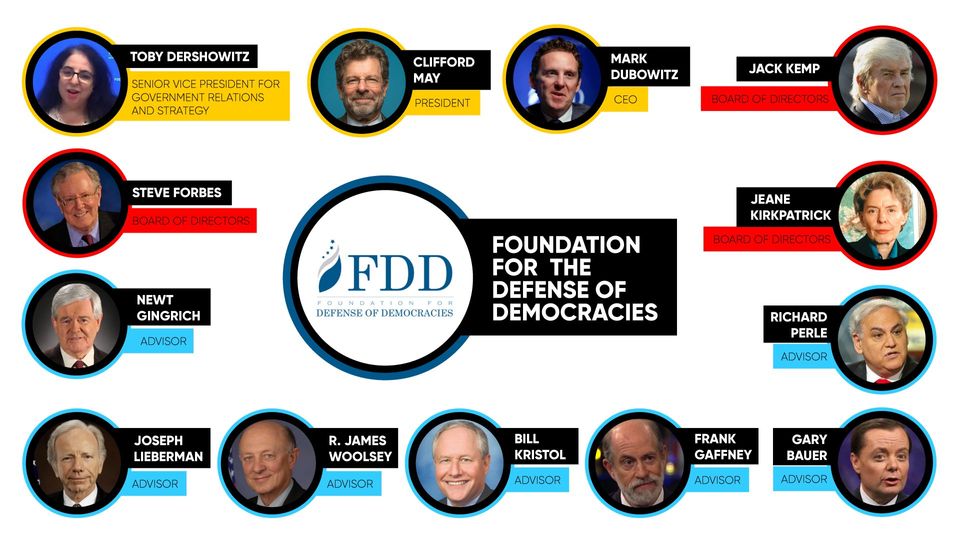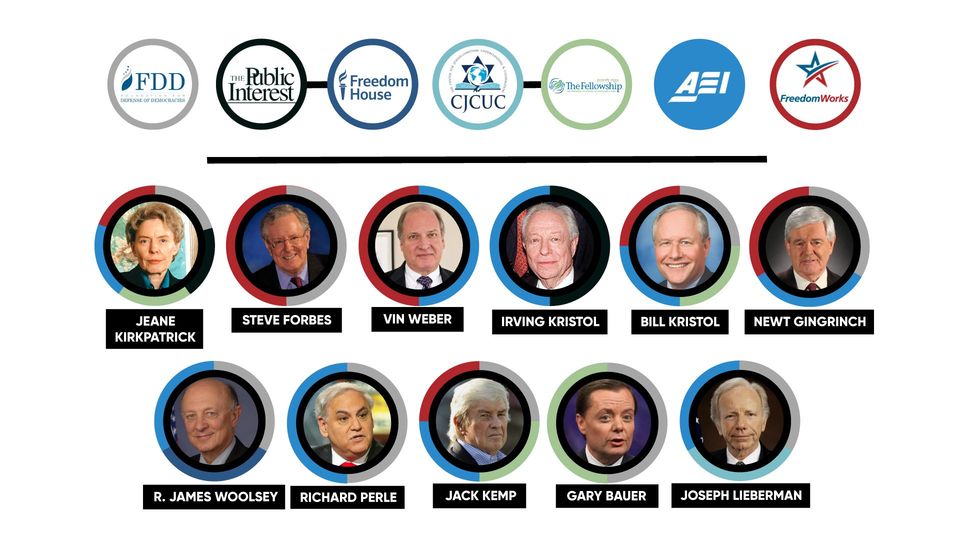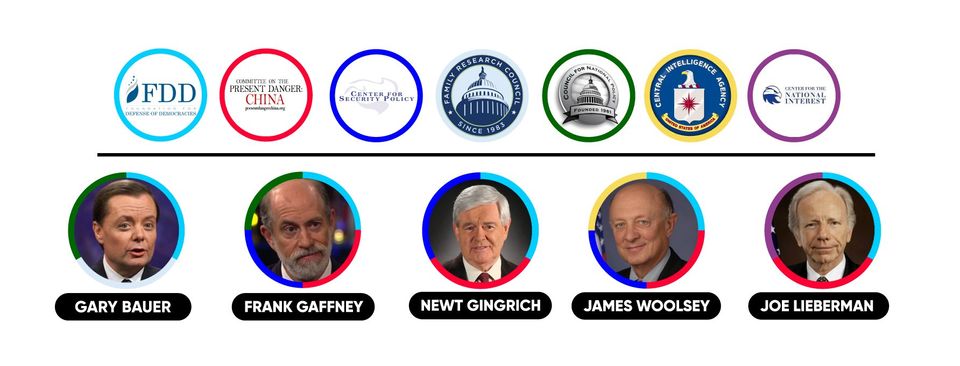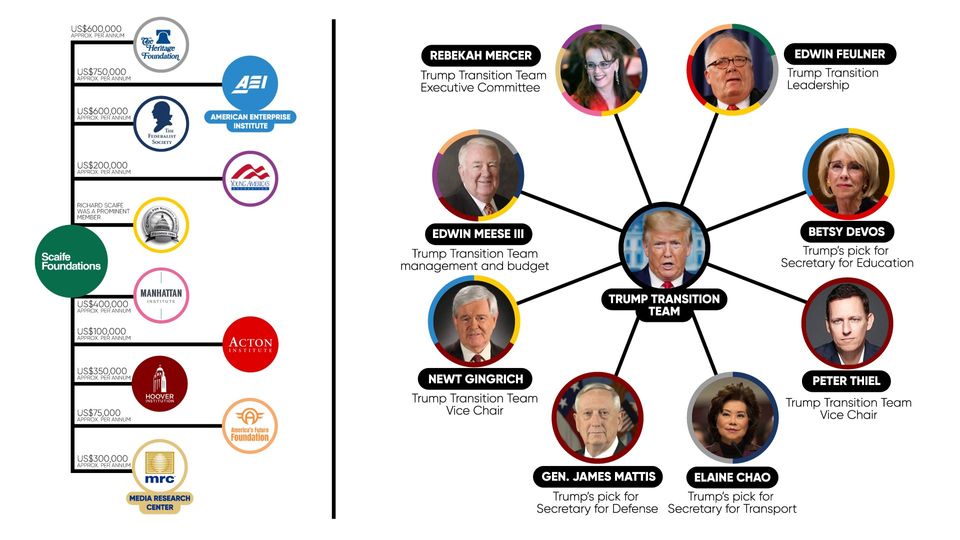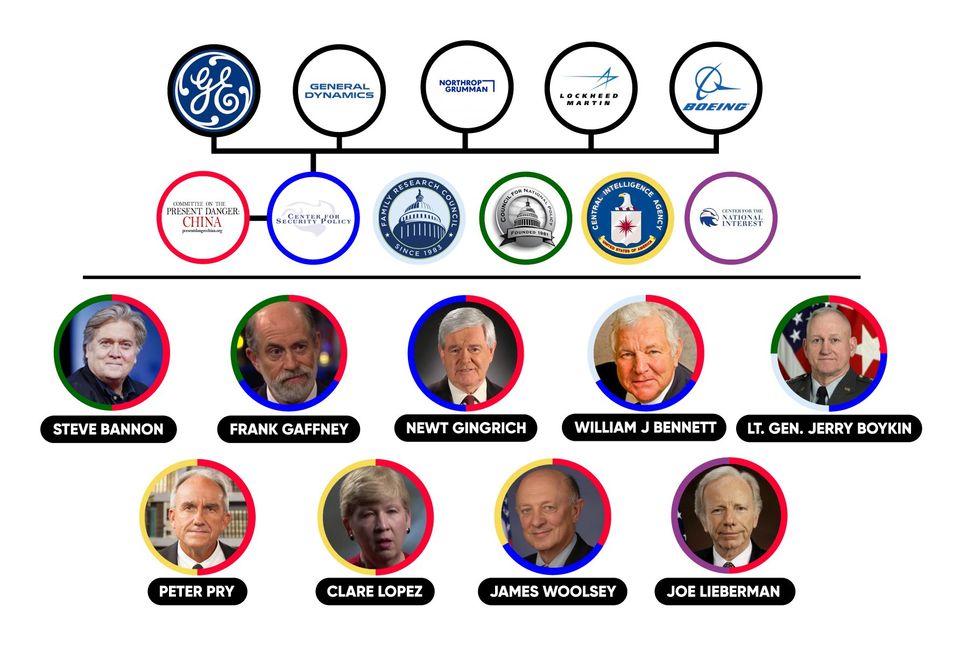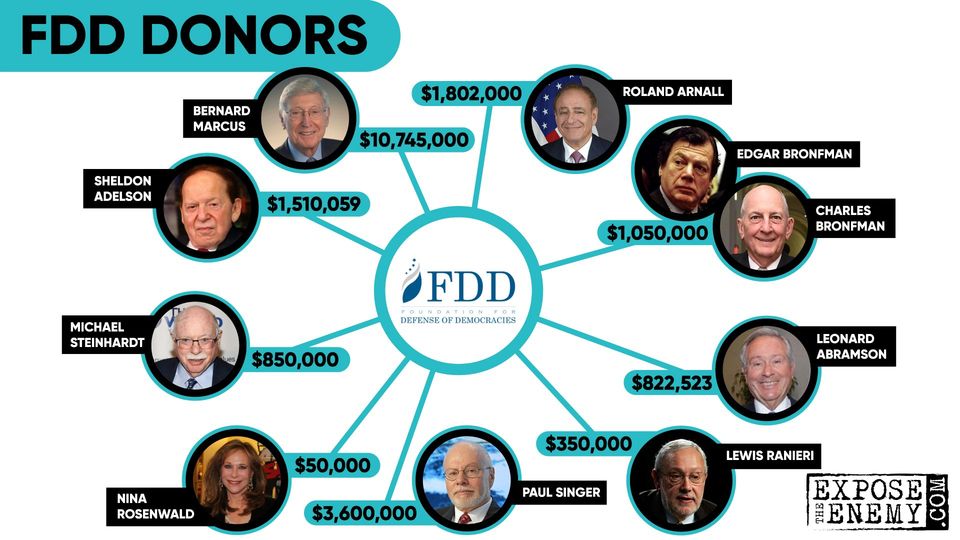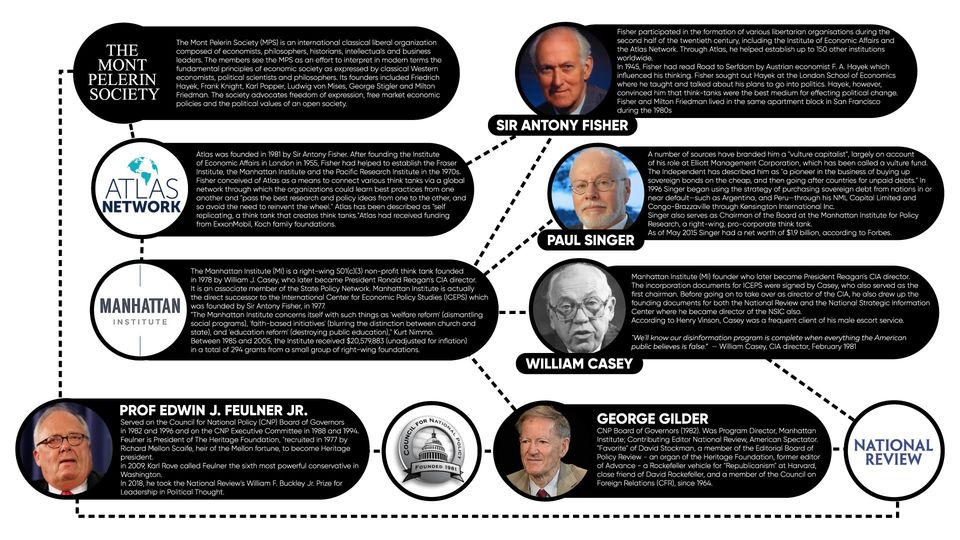FOUNDATION FOR THE DEFENSE OF DEMOCRACIES
The Foundation for Defense of Democracies (FDD) is 501(c)(3) non-profit think tank and policy institute and registered lobbying organization based in Washington, D.C., United States.
Its political leanings have been described variously as nonpartisan, hawkish, and neoconservative. FDD holds events throughout the year, including its annual Washington Forum, briefings on Capitol Hill, expert roundtables for public officials, diplomats, and military officers, book releases, and panel discussions and debates within the policy community.
FDD publishes research on foreign policy and security issues, focusing on subjects such as nuclear-non proliferation, cyber threats, sanctions, illicit finance, and policy surrounding North Korea, Iran, Russia, the war in Afghanistan, and other areas of study.
FDD has been identified as part of the Israel lobby in the United States by several scholarly sources.
Origins
In early 2001, a tightly knit group of Jewish billionaire conceived of a plan to win American sympathy for Israel's response to the Palestinian intifada. They believed that the Palestinian cause was finding too much support within crucial segments of the American public, particularly within the media and on college campuses, so they set up an organization, Emet: An Educational Initiative, Inc., to offer Israel the kind of PR that the Israeli government seemed unable to provide itself.
At first, Emet floundered, without an executive director or a well-defined mission. But that changed after Sept. 11, and Emet changed too, into what is now the Foundation for the Defense of Democracies. The name is different, but the goal of influencing America's opinion-forming classes remains.
What makes all of this possible is the support the foundation receives from its billionaire backers. Its nearly $3 million annual budget comes from 27 major donors, most of whom are members of "the Study Group"--also sometimes called the "Mega Group" a semi-formal organization of major wealthy Jewish who meet twice a year to discuss joint projects.
Leonard Abramson was the point man for establishing Emet. He, Michael Steinhardt, and Edgar Bronfman were the foundation's board of directors at the time of its incorporation in the spring of 2001.
Mission
FDD was founded shortly after 9/11. In the initial documents filed for tax-exempt status in Internal Revenue Service, the FDD stated its mission "was to provide education to enhance Israel's image in North America and the public's understanding of issues affecting Israeli-Arab relations". Later documents described the mission as "to conduct research and provide education on international terrorism and related issues".
On its website, FDD describes itself as a "a non-profit, non-partisan 501(c)3 policy institute", with focus "on foreign policy and national security that combines policy research, democracy and counterterrorism education, strategic communications and investigative journalism in support of its mission to promote pluralism, defend democratic values and fight the ideologies that drive terrorism".
FDD has been identified as part of the Israel lobby in the United States by several scholarly sources. Sima Vaknin-Gil, Director General of Israel's Ministry of Strategic Affairs, had stated that the FDD works in conjunction with Israeli government, in particular the ministry she works for. Later documents described the mission as "to conduct research and provide education on international terrorism and related issues".
On 15 November 2019, FDD was finally officially registered as a lobby under Lobbying Disclosure Act of 1995.
UAE
In 2018, AP reported that the United Arab Emirates has wired $2,500,000 to the FDD through Elliott Broidy and George Nader, to host a conference amidst Qatar diplomatic crisis about the country's role as a state-sponsor of terrorism. FDD stated that it does not accept money from foreign governments, adding that "[a]s is our funding policy, we asked if his funding was connected to any foreign governments or if he had business contracts in the Gulf. He assured us that he did not".
Adam Hanieh states that the FDD high-profile conference of 23 May 2017 was in line with UAE's policy at the time, which officially alleged that Qatar finances Islamist groups, adding that emails leaked shortly after show that UAE's Ambassador Yousef Al Otaiba had a "cosy relationship" with the FDD, and had reviewed the remarks made by Robert Gates at the convention.
In 2020 Israel and UAE have official confirmed that they have "normalized" relations.
Successor to PNAC
According to Jeffrey Blankfort, a Jewish anti-Zionist activist in California (former editor of the Middle East Labor Review, and victim of a spying operation directed against him by the ADL), gave his assessment of the FDD:
For those of you who haven't heard of this "foundation," it is one of the most influential and powerful of the Zionist lobbies which changed its name and sprung into action immediately after 9-11. If you check its board, its advisors, you'll find a lot of familiar names, the neocons, of course, and some surprises, like the Democrat's ranking African-American spokesperson, Donna Brazile. It claims to have seven articles from FDD sources appear in the mainstream media every day and if you check its site, that appears to be the truth. That President Bush chose this group for the first of a series of speeches defending his Iraq policy is not an accident but a genuflection to the FDD's power. Another reflection of its power is the apparent unwillingness of the major media, such as the NY Times, to identify it for what it is.
Jeffrey Blankfort suggests that the best assessment of FDD is that it is the successor of PNAC, as many of the PNAC-associated neocons now reside at the FDD
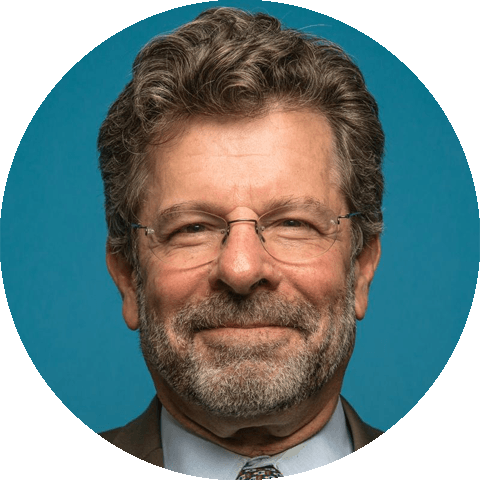
CLIFFORD MAY
PRESIDENT
(born 1951) is a pro-Israel journalist, editor, political activist, and podcast host. He is the front man and president of the Foundation for Defense of Democracies, a non-partisan policy institute created shortly after 9/11. where he hosts the podcast "Foreign Podicy" were he advocates all kinds of neocon hawkish narratives and conspiracy theories. He is the weekly "Foreign Desk" columnist for the Sun Myung Moon founded, The Washington Times. He previously served as commissioner on the United States Commission on International Religious Freedom (USCIRF), an independent, bipartisan U.S. federal government commission that makes policy recommendations concerning international religious freedom. It is mainly used to highlight authoritarian regimes and backward fundamentalists and selective humanitarian crises for pushing for "regime change" and further foreign entanglement. The long history of US and Israeli role in atrocities are ignored by USCIRF.
May is also the Chairman of the Policy Committee department within the Committee on the Present Danger. May was also previously a weekly columnist for Scripps Howard News Service and National Review Online. May has been widely published, including in The Wall Street Journal, Commentary, USA Today, and The Atlantic. He has served as a reporter, a foreign correspondent, and a newspaper/magazine editor, working notably for Newsweek in the 1970s and for The New York Times in the 1980s.
May is also a member of the Henry Jackson Society. In October 2007, The Daily Telegraph named May number 94 in its list of the '100 most influential conservatives in America', identifying him as a neo-conservative within the Republican Party.
May served as the Director of Communications for the Republican National Committee from 1997 to 2001. In his position, he oversaw activities such as strategic planning, press, radio, television, online services, speech writing, and advertising. He also worked as the editor of Rising Tide, the official Republican Party magazine. He also was Vice Chairman of the Republican Jewish Coalition.
After leaving the RNC, he became a director in the Washington, D.C. office of BSMG Worldwide, a public affairs and public relations company. In 2006, he was appointed an adviser to the Iraq Study Group. He strongly dissented from the recommendations that the group came to, and he then worked with various groups to oppose the policies. On July 11, 2008, May was nominated by President George W. Bush to be a member of the Broadcasting Board of Governors for a term expiring August 13, 2009. "In this very challenging period of history, it is vital that the United States communicates with audiences abroad clearly and creatively,” May said, “I will be honored and privileged if I can assist with this mission.”
Foreign policy position
The Daily Telegraph described May as "an outspoken proponent of the need to achieve victory in Iraq and the broader war against Muslim extremism".
May supports the use of 'enhanced interrogation techniques', other than waterboarding, against those captured by the United States in what he calls the War on Terror so long as they are used as a "last resort". He views them as fundamentally different from 'torture'. He also opposes regarding those captured as either criminal defendants or prisoners of war.
May supported the 2003 invasion of Iraq that was based on lies and a fabricated pretext. Years later after the non existent Iraqi WMDs weren't discovered and the desired "regime change" he continued to support US forces' presence in Iraq and
support the 2007 "surge" strategy to increase in the number of American troops in order to provide security to Baghdad and Al Anbar Governorate. In March 2008, he continued to promote the heavily criticized and dubious Bush administration narratives. He wrote for National Review Online, "[w]hat one can not say is that regime change in Iraq was unjustified: Not if you know Saddam’s record, his clearly stated intentions, and his ties to international terrorists—including, as a new Pentagon report reveals, a group headed by Ayman al-Zawahiri, now al Qaeda’s second-in-command."
What May doesn't tell you is that the alleged Ayman al-Zawahiri contact was in 1992 when Bin Laden was head of the newly founded Taliban that was created by the US backed Mujahideen in the war against the Soviets. The alleged meeting is said to have taken place over Hussein's concerns of al-Zawahiri backing anti-Saddam insurgents in Iraq.
It is important to note that the "Pentagon report" was created after the fabricated "WMD" stories and story of Saddam purchasing of yellow-cake from Africa fell apart. The later is related to Plamegate. Therefore the original narrative at this point had completely fallen apart.
Plamegate
During the beginning of the 2003 Plamegate scandal, May wrote that an ex-administration official had told him that Valerie Plame was a CIA agent, and May stated that the fact was an open secret widely known across Washington, D.C. He also remarked that he chose not to mention this in his own writings since he considered this to be irrelevant to anything else. May basically downplayed the severity of Novak's leak.
David Corn, writing for The Nation in March 2007 in the aftermath of the scandal, disputed May's assertions, and he quoted Plame as saying that only a handful of people knew about her covert status. Corn then called upon May, along with other conservative commentators such as Jonah Goldberg who had made similar statements, to apologize.
The truth is that Plame was publicly exposed as a CIA asset by this pro-Israel neoconservative network because she did not go along with their "Saddam purchased yellow-cake" narrative to justify the invasion of Iraq.
Media Matters
In September 2007, Media Matters for America criticized May for making numerous public appearances in support of the Bush administration without mentioning his relationship with Secretary of State Condoleezza Rice's Advisory Committee on Democracy Promotion or the fact that the Foundation for the Defense of Democracies had received State Department monetary grants.
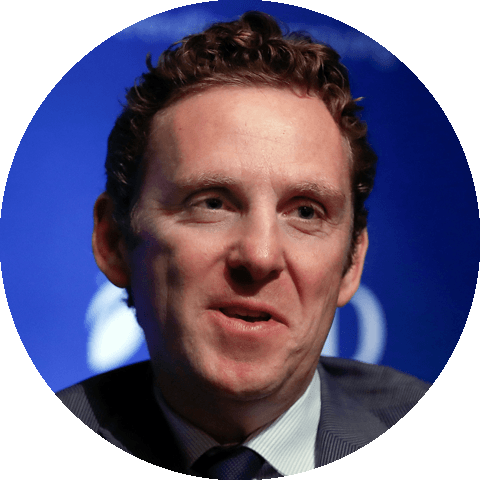
MARK DUBOWITZ
CEO
Mark Dubowitz (11 September 1968) is a South African-born Canadian-American attorney and former venture capitalist, currently serving as CEO of the Foundation for Defense of Democracies, a non-profit think-tank and lobbying institute that advocates for hawkish foreign policy. He is a proponent of sanctions against Iran to escalate a confrontation with Iran and was a leading critic of the Iran nuclear agreement, officially called the Joint Comprehensive Plan of Action. According to The New York Times, “Mark Dubowitz’s campaign to draw attention to what he saw as the flaws in the Iran nuclear deal has taken its place among the most consequential ever undertaken by a Washington think tank leader.” NY Times can't seem to correlate the words of Dubowitz and the agenda of his paymasters.
A whole stream of disinformation and lies stemming from FDD and the larger connected network of pro-Israel groups have spewed out since the Iran Deal was signed by Obama and have continued throughout the Trump administration.
Amazingly, Dubowitz claims he tried to save the Iran Deal after President Trump withdrew from the agreement according to his own account. Maybe this was Dubowitz trying to distance the pro-Israel lobby and their influence from the control of foreign policy within the Trump administration.
Dubowitz earned a master's degree in international public policy from the Paul H. Nitze School of Advanced International Studies at Johns Hopkins University, where he focused on China. He also earned a Juris Doctor and Master of Business Administration from the University of Toronto. He has also studied at Jerusalem's Hebrew University. He spent the first 8 years after law school working on lobbying for the funding of technology start-ups in Toronto, as an attorney and venture capitalist in Toronto.
As well as being CEO of the Foundation for Defense of Democracies, Dubowitz is also a co-founder FDD’s Center on Economic and Financial Power and FDD’s Center on Military and Political Power, and is the author or co-author of more than twenty studies on economic sanctions on Israel's enemies. He also is co-chair of the Project on U.S. Middle East Nonproliferation Strategy which focuses on distracting away from Israel and the lack of oversight for the Israeli nuclear weapons program.

TOBY DERSHOWITZ
SENIOR VP FOR GOVERNMENT RELATIONS AND STRATEGY
Toby Dershowitz is senior vice president for government relations and strategy at FDD. She also oversees FDD’s Communications Department, which yields thousands of print and broadcast media appearances each year. She has more than 30 years of experience in Washington, focusing on policy issues related to terrorism, cyber security, sanctions, the Middle East, and illicit networks in Latin America. She leads FDD’s policy road mapping initiatives by identifying the conceptual issues and the strategy necessary to move the dial in various policy arenas. Possessing a strong commitment to bi-partisanship, she briefs and works closely with members of Congress and their staff, as well as with officials throughout the executive branch.
She has written extensively pushing the refuted claim that Iran played a role in the 1994 bombing of the AMIA Jewish community center in Buenos Aires, Argentina.
Dershowitz's anti-Iran bigotry and nonsense narrative is investigated here
Despite these revelations Dershowitz continues to use this anti-Iran propaganda to lobby policymakers to target Iran with crippling sanctions.

STEVE FORBES
DIRECTOR
Born July 18, 1947. Forbes is an American publishing executive. Forbes was a candidate in the 1996 and 2000 Republican Presidential primaries. Forbes is the Editor-in-Chief of Forbes, a business magazine. Forbes is the son of longtime Forbes publisher Malcolm Forbes, and the grandson of that publication's founder, B.C. Forbes. He is an adviser at the Forbes School of Business & Technology.
In 1985, President Ronald Reagan appointed Forbes as head of the Board of International Broadcasting (BIB), Radio Free Europe/Radio Liberty (CIA).
Campaigns for president and major issues
Forbes entered the Republican primaries for President of the United States in 1996 and 2000, primarily running on a campaign to establish a flat income tax for the sole reason for his cronies and himself to avoid paying tax.
Forbes also supported the ideas of re-introducing 4.5% mortgages in 1996. The lack of regulations on the mortgage industry led to the 2008 economic collapse.
When Forbes ran for President in 1996 and 2000, he sold some of his Forbes, Inc. voting shares to other family members to help finance his run. Forbes did not come close to securing the Republican nomination, despite winning the Arizona and Delaware primaries in 1996, and getting some significant shares of the vote in other primaries. Forbes's awkward campaigning style was considered to be a major factor in his defeat. Time Magazine called his stumping a "comedy-club impression of what would happen if some mad scientist decided to construct a dork robot." For his 2000 presidential campaign, he raised $86,000,000 in campaign contributions, of which $37,000,000 were self-donated.
After dropping out early in the 2000 primary season, Forbes returned to heading the magazine and company. During the 1996 campaign, insiders at Fortune alleged that stories about Forbes's advertisers became favorably biased toward them.
Major issues Forbes has supported include free trade, health savings accounts, and allowing people to opt out 75% of Social Security payroll taxes into personal retirement accounts (PRAs). Forbes supports traditional Republican Party policies such as downsizing government agencies to balance the budget, tough crime laws and support for the death penalty, and school vouchers. Forbes opposes gun control and most government regulation of the environment, as well as drug legalization and same-sex marriage, in spite of his father being gay. In terms of foreign policy, he called for a "US not UN foreign policy" (which is composed of anti-International Monetary Fund sentiments, pro-Israeli sentiment, opposition to Most Favored Nation status for the People's Republic of China, and anti-UN sentiment.)
Forbes’s flat tax plan has changed slightly. In 1996, Forbes supported a flat tax of 17% on all personal and corporate earned income (unearned income such as capital gains, pensions, inheritance, and savings would be exempt.) However, Forbes supported keeping the first $33,000 of income exempt. In 2000, Forbes maintained the same plan; however, instead of each person receiving an exemption of $33,000, it more closely resembled the Armey Plan (Forbes's version called for a $13,000 per adult and $5,000 per dependent deduction). Forbes is very wealthy, with a net worth in 1996 of $430 million. In response to this criticism, Forbes promised in his 2000 campaign to exempt himself from the benefits of the flat tax, although he did support the repeal of the 16th Amendment in a debate with Alan Keyes the previous year.
In his 2000 campaign, Forbes professed his support for social conservatism along with his supply-side economics. Despite holding opposite positions in 1996, for the 2000 campaign, Forbes announced he was adamantly opposed to abortion and supported prayer in public schools. The previous year Forbes had issued a statement saying he would no longer donate money to Princeton University due to its hiring of philosopher Peter Singer, who views personhood as being limited to 'sentient' beings and therefore considers some disabled people and all infants to lack this status. Steve Forbes was one of the signers of the Statement of Principles of Project for the New American Century (PNAC) on June 3, 1997.
Other political activities
In 1996, Forbes campaigned on behalf of Ron Paul in the congressional election for Texas's 14th congressional district.
Forbes co-founded Empower America with fellow FDD Director Jack Kemp.
In December 2006, Forbes joined the Board of Directors of the advocacy organization FreedomWorks. (Empower America was a right-wing think tank established in 1993. In July 2004 it merged with Citizens for a Sound Economy to form FreedomWorks).
Forbes is also on the board of directors of the National Taxpayers Union. Forbes is also a member of the board of trustees of The Heritage Foundation, an influential Washington, D.C.-based public policy research institute. Forbes is a frequent panelist on the television program Forbes on Fox, which also features members of the Forbes magazine staff, and is shown Saturday mornings on Fox News Channel at 11:00 am EST.
On March 28, 2007, Forbes joined Rudy Giuliani's campaign for the 2008 Presidential election, serving as a National Co-Chair and Senior Policy Advisor. Later in the 2008 presidential campaign, Forbes served as John McCain's Economic Adviser on Taxes, Energy and the Budget during McCain's bid for the 2008 Presidential election.
In March 2013, Forbes participated in a NPR broadcast Intelligence Squared debate with James Grant, Frederic Mishkin and John R. Taylor Jr. concerning the motion "Does America Need A Strong Dollar Policy?".
Forbes is on the Council for National Policy (CNP) Board of Governors.
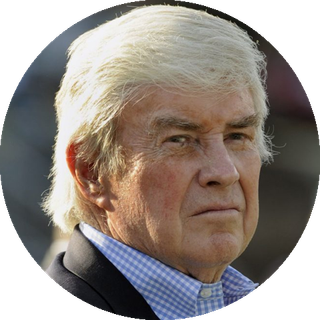
JACK KEMP
DIRECTOR
Jack French Kemp (July 13, 1935 – May 2, 2009) was an American politician and a professional player in both American football and Canadian football. A member of the Republican Party from New York, he served as Housing Secretary in the administration of President George H. W. Bush from 1989 to 1993, having previously served nine terms in the United States House of Representatives from 1971 to 1989. He was the Republican Party's vice presidential nominee in the 1996 election, as the running mate of presidential nominee Bob Dole. Kemp had previously contended for the presidential nomination in the 1988 Republican primaries.
As an economic conservative, Kemp advocated low taxes and supply-side policies during his political career. His positions spanned the social spectrum, ranging from his conservative opposition to abortion to his more libertarian stances advocating immigration reform. As a proponent of both Chicago school and supply-side economics, he is notable as an influence upon the Reagan agenda and the architect of the Economic Recovery Tax Act of 1981, which is known as the Kemp–Roth tax cut. This is part of what was dubbed "Reaganomics". You can learn more about the Chicago School here
Long scrubbed from the internet but fortunately archived, Catherine Austin Fitts' revelations investigating the HUD Savings and Loans / Silverado scandals working under Jack Kemp are available here
Kemp was a honorary co-chairman of the Alexis de Tocqueville Institute (AdTI), a conservative, anti-tax think-tank, in the mid-1990s at a time when AdTI was involved in pro-tobacco activities sponsored by Philip Morris (see AdTI-Funding). A Philip Morris document indicates that in 1994 AdTI drafted an article supposedly authored by Kemp which condemned the Clinton administration's proposed cigarette tax increase to cover health care. The article was published in the Los Angeles Times.
Kemp was a long time CNP Member (his name appears on 1984-85, 1988, 1996, 1998 membership lists). Kemp was an honorary Freemason of the Scottish Rite (33 degree)
Kemp was a co-founded Empower America with fellow FDD director Steve Forbes. Kemp was also a co-director of Empower America with William Bennett (FRC, CSP) , Jeanne Kirkpatrick (fellow FDD director) and Vin Weber, who is co-director of the Aspen Institute’s Domestic Strategy Group.
Neocon Bilderberger William Kristol (FDD Advisor) joined with Council on Foreign Relations member Vin Weber in forming Empower America in 1991. The President and CEO of Empower America is Josette Shiner, a high-ranking Unification Church member and former editor at the Moon-owned Washington Times newspaper. On the board of Empower America is CNP and Honorary Scottish Rite Freemasons, Trent Lott and Newt Gingrich. (FDD Advisor). Empower America merged with Citizens for a Sound Economy to form a new group called FreedomWorks in 2004.
Affiliations
American Enterprise Institute
Committee on the Present Danger
Council For National Policy (CNP)
Council on Foreign Relations: Former Co-Chair, Council Task Force on Russian-American Relations
Empower America/ FreedomWorks co-founder
Foundation for the Defense of Democracies, Director
Heritage Foundation: Former Distinguished Fellow, Lecturer
Hoover Institution: Former Visiting Fellow
International Democratic Union: Former Committee Chair
International Fellowship of Christians and Jews (IFJC)
Jewish Institute of National Security Affairs: Former Member, Board of Advisors
Townhall.com: Former Contributing Columnist
Realizing the Dream – Advisory Board
Business
Kemp Partners: Founder, Chairman
Free Market Global: Former member, Board of Directors
G2 Satellite Solutions: Former member, advisory board Member
SmartCOP: Former Board Member
Oracle: Former Board Member
Epoch Innovations: Former Board Member
Hawk Corporation: Former Board Member
IDT Telecom: Former Board Member
ING Americas: Former Board member
Thayer Capital: Former Advisory Board Member
Thomas Weisel Partners: Former Advisory Board Member
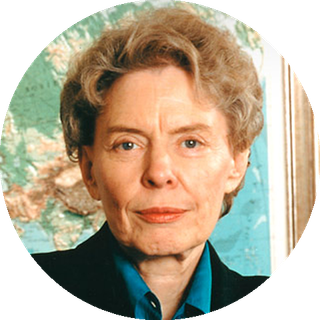
JEANE KIRKPATRICK
DIRECTOR
(née Jordan; November 19, 1926 – December 7, 2006) was an American diplomat and political scientist who played a major policy role in the foreign policy of the Ronald Reagan administration. An ardent anticommunist, she was a longtime Democrat who became a neoconservative and switched to the Republican Party in 1985. After serving as Ronald Reagan's foreign policy adviser in his 1980 campaign, she became the first woman to serve as United States Ambassador to the United Nations.
She was known for the "Kirkpatrick Doctrine", which advocated supporting authoritarian regimes around the world if they went along with Washington's aims. She believed that they could be led into democracy by example. She wrote, "traditional authoritarian governments are less repressive than revolutionary autocracies." She sympathized with the Argentine government during the Falklands War when President Reagan came out in support of Margaret Thatcher.
Kirkpatrick served on Reagan's Cabinet on the National Security Council, Foreign Intelligence Advisory Board, Defense Policy Review Board, and chaired the Secretary of Defense Commission on Fail Safe and Risk reduction of the Nuclear Command and Control System. She wrote a syndicated newspaper column after leaving government service in 1985, specializing in analysis of the activities of the United Nations.
As a college freshman in 1945 Kirkpatrick joined the Young People's Socialist League, the youth wing of the Socialist Party of America, influenced by her grandfather who was a founder of the Populist and Socialist parties in Oklahoma.
In 1968, Kirkpatrick earned a PhD in political science from Columbia At Columbia University, her principal adviser was Franz Leopold Neumann, a revisionist Marxist. In 1967, she joined the faculty of Georgetown University and became a full professor of government in 1973. She became active in politics as a Democrat in the 1970s and was involved in the later campaigns of former Vice President and Democratic presidential candidate Hubert Humphrey. Along with Humphrey, she was close to Henry Jackson, who ran for the Democratic nomination for President in 1972 and in 1976.
Kirkpatrick and her husband Evron (OSS, State Department and was Director of the Office of Intelligence Research. His specialty was behavioral science. Since 1954, he had been the executive director of the American Political Science Association) were close to Social Democrats USA a branch of the Socialist International, Kirkpatrick is listed on the advisory board of another Socialist International organization, the League for Industrial Democracy, housing both "right-wing" and "left-wing" socialist agents. The League for Industrial Democracy has been dubbed the American version of the Fabian Society.
Before she entered the Reagan administration, with help from National Security Adviser Richard Allen, Kirkpatrick worked with Senators Daniel Moynihan and Henry Jackson and leaders of the AFL-CIO in the Coalition for a Democratic Majority,
a grouping disingenuously billed as a conservative Democratic alternative to George McGovern's leftwing takeover of the party. Once the hawkish Democrats such a Jackson couldn't find a dominant voice and power at the top of the Democratic party after failed presidential nomination attempts they moved to take over the Republican party with Republican allies to create what we call today, the Neoconservative movement.
Like many in Jackson's circle she became identified with neoconservatism. She opposed to the candidacy of George McGovern in 1972 and that year she joined with Richard V. Allen and others to found the Committee on the Present Danger for the purpose of exaggerating the threat of the Soviet Union and their military power and the dangers of the SALT II treaty. She also served on the Platform Committee for the Democratic Party in 1976.
Kirkpatrick published a number of articles in political science journals reflecting her disillusionment with the Democratic Party with specific criticism of the foreign policy of Democratic President Jimmy Carter. Her most well known piece was "Dictatorships and Double Standards", published in Commentary in November 1979
Kirkpatrick's appointment to the UN was reportedly based on her "Dictators and Double Standards" article, in which she drew the distinction between "moderately repressive regimes" such as Anastasio Somoza's in Nicaragua, and "totalitarian" ones such as the Soviet Union, and urged the United States to make common cause with the former against communism and consider the Soviet Union its primary adversary. Beneath the anticommunist rhetoric, Kirkpatrick's writings defend a more insidious premise that the vast majority of the world's nations can have neither democratic governments nor significant economic development, and that the United States should abandon its concern for both objectives.
Kirkpatrick's outlook stems from her admiration for Sir Karl Popper, the successor to "New Dark Age" advocate Bertrand Russell as head of Britain's Aristotle Society. Popper is best known for his ideological tracts equating Platonism with "totalitarianism," and for his defense of Aristotle's bestial pragmatism. He was also a founder of the Mont Pelerin Society and a key figure at the London School of Economics were he met his protege, George Soros.
Kirkpatrick's allegiance to Popper was demonstrated in her recent participation in founding the Committee for the Free World. The committee claims Popper as its ideological godfather. Interestingly George Soros honors Popper by naming his social engineering front, Open Society after one of Popper's book "The Open Society and Its Enemies" that greatly influenced him. The same book contains his analysis that Plato was the greatest authoritarian theorist of the ancient world.
Addressing the group's first meeting in February 1981. Kirkpatrick vowed to use
her U.N. ambassadorship to "pursue a parallel political course."
Kirkpatrick was also part of the International Fellowship of Christians and Jews (IFCJ) a Christian Zionist organization.
Kristol Connections
Kirkpatrick was a member of Coalition for a Democratic Majority (CDM) a group co-founded by FDD Advisor Bill Kristol's father Irving.
That isn't Kirkpatrick's only connection to Irving. He also found The Public Interest Magazine, a Freedom House publication. Kirkpatrick was a trustee of the magazine. FDD Advisor and former CIA Director R. James Woolsey was chairman of Freedom House.
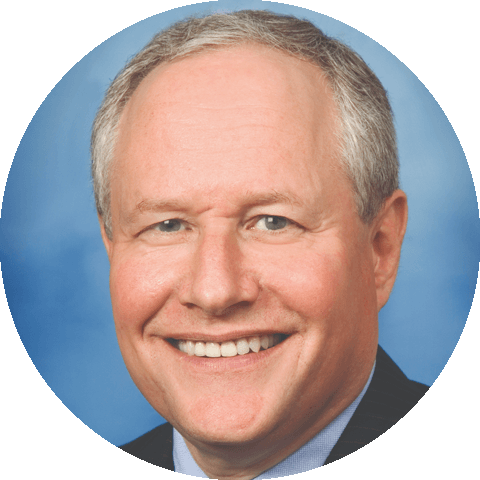
BILL KRISTOL
ADVISOR
(born on December 23, 1952) Born into a Jewish family in New York City, Kristol graduated in 1970 from The Collegiate School. In 1973 he received a B.A. from Harvard College and in 1979 a Ph.D. in government, also from Harvard.
Kristol is a political commentator and editor of the neoconservative Weekly Standard. He was a prominent supporter of the war against Iraq. He also supports the campaign against Iran. He is the editor of the political magazine The Weekly Standard and the chairman and co-founder of the Project for the New American Century (PNAC), which advocates American military dominance worldwide.
Kristol is the son of Irving Kristol (one of the founders of the neoconservative movement) and Gertrude Himmelfarb.
Kristol is a political contributor for the FOX News Channel (FNC) and serves as a regular contributor to Special Report with Brit Hume. In December 2007, The New York Times offered Kristol space for a weekly column in its OpEd pages.
Project for the Republican Future
Kristol first made his mark as leader of the Project for the Republican Future, a conservative think tank, and rose to fame as a conservative opinionmaker during the battle over the Clinton health care plan. In his first strategy memo circulated among Republican policymakers, Kristol said the party should "kill", not amend or compromise on, the Clinton health care plan. The success of the Clinton proposal, he warned, would “re-legitimize middle-class dependence for ‘security’ on government spending and regulation,” and “revive ... the Democrats, as the generous protector of middle-class interests.”
Kristol's memo immediately became important in uniting Republicans behind total opposition to Clinton's reform plan. A later memo advocated the phrase There is no health care crisis, which Senate Minority Leader Bob Dole used in his response to Clinton's 1994 State of the Union address.
Weekly Standard
After the Republican sweep of both houses of Congress in 1994 Kristol established, along with neoconservative John Podhoretz and with financing from Rupert Murdoch, the neo-conservative periodical The Weekly Standard.
History of warmongery
Kristol was one of the signatories to the January 26, 1998, PNAC letter sent to President Bill Clinton urging him "to seize that opportunity" in his upcoming State of the Union "to enunciate a new strategy that would secure the interests of the U.S. and our friends and allies around the world. That strategy should aim, above all, at the removal of Saddam Hussein's regime from power."
He was "one of the architects of the blueprint for regime change found in the [September 2000] document 'Rebuilding America's Defenses: Strategies, Forces and Resources for a New Century'"
Kristol also signed the 20 September 2001, PNAC letter endorsing President George W. Bush's "admirable commitment to 'lead the world to victory' in the war against terrorism."
Kristol said in a 14 January 2003, PBS Frontline interview "that the significance of President George W. Bush's State of the Union address in 2002 (the 'axis of evil' speech) is too easily forgotten -- that it was a rare moment, 'the creation of a new American foreign policy' -- and that Bush deserves credit for realizing very quickly after Sept. 11 that his presidency would be judged by how he handled the post-9/11 threat of weapons of mass destruction."
Kristol is co-author with Lawrence F. Kaplan of The War Over Iraq: Saddam’s Tyranny and America’s Mission.
Most recently he has been a vocal supporter of the Israeli attack on Lebanon, stating that the war is "our war too," referring to the United States. He continues to back the Iraq war, and favors a war with Iran.
Neocon Think Tanks
In 1997, he founded, with Robert Kagan, the Project for the New American Century (PNAC). He is also a member of the neo-conservative think tank the American Enterprise Institute which provides office space to PNAC and from which the Bush administration has borrowed over two dozen members to fill various government offices and panels. Kristol is a patron of the British think tank the Henry Jackson Society, based at Cambridge.
Dragging Bush further right
Kristol has not always fallen in line behind the Bush administration, and has on occasion criticized Bush for not being conservative enough. In 2004, he wrote an op-ed strongly criticizing Secretary of Defense Donald Rumsfeld. He was also the first of many conservatives to publicly oppose Bush's second U.S. Supreme Court nominee, Harriet Miers. He said of Miers: "I'm disappointed, depressed, and demoralized. [...] It is very hard to avoid the conclusion that President Bush flinched from a fight on constitutional philosophy. Miers is undoubtedly a decent and competent person. But her selection will unavoidably be judged as reflecting a combination of cronyism and capitulation on the part of the president."
Media and Academia
He is currently a visiting professor at Harvard University where he teaches at the Kennedy School of Government. In addition to his role as a political contributor on FOX News, Kristol was for a time a semi-regular guest on the now cancelled World News Tonight on Sky News, appearing live from the US.
Stem cell research
In November 2002, Kristol, as Chairman of the Bioethics Project of the New Citizenship Project, attended the Third Annual Siebel Scholars Conference which addressed stem cell research at Stanford University/Stanford Engineering at Palo Alto, CA. Kristol has written against the form of stem cell research that involves human embryos.
Controversy and criticism
In 2005 Kristol caused controversy by praising President George W. Bush's second inaugural address without disclosing his role as a consultant to the writing of the speech. Kristol praised the speech highly in his role as a regular political contributor during FOX's coverage of the address, as well as in a Weekly Standard article, without disclosing his involvement in the speech either time.
On 2 January 2, 2007, David Corn of The Nation posted a list of Mr. Kristol's pre-Iraq war statements "about the justification for the war, the costs of the war, the planning for the war, and the consequences of the war." All the statements listed have since been shown to be wrong, leading Mr. Corn to conclude that "Kristol displayed little judgment or expertise...In an effectively functioning market of opinion-trading, Kristol's views would be relegated to the bargain basement."
New York Times pundit
On 29 December 2007, the New York Times announced that Kristol would write a regular column fot the NYT Op-ed pages. Howard Friel had this to say about the appointment:
Just in time for election year, the New York Times announced on December 29 that it had hired William Kristol as an op-ed page columnist, with the first column scheduled to appear on January 7, 2008. The Times’ editorial page editor Andrew Rosenthal, responding to early critics of the move, said that the Times “is giving voice to a guy who is a serious, respected conservative intellectual—and somehow that’s a bad thing. How intolerant is that?” Since Kristol already has his own magazine (Weekly Standard) and a regular seat among the talking heads on TV (Fox News), it’s hard to identify any public interest served by “giving voice” to him in the Times, and thus rehabilitate a serial advocate of lawless global conduct by the United States.
…
Given this context, if Andrew Rosenthal were in fact motivated by hiring an unrepresented point of view at the Times, he could have hired someone who opposed the invasion of Iraq—before the invasion was launched—on grounds that it violated the UN Charter and other major sources of international law. At least two officially retired but still-active professors come to mind—Noam Chomsky and Richard Falk. But since it’s the Times that has a “fear of opposing views”—including an apparent fear of the UN Charter—Rosenthal hired Kristol instead, probably to offset the editorial page’s now more aggressive criticism of the Bush administration.
So what is the difference between the Times and William Kristol, who still supports the Iraq invasion? The difference is that the Times “was for it before it was against it.” That’s not much of a difference, given that, once you’re for it, and it happens, it’s too late to be against it.
Jim Lobe commented on the appointment:
The New York Times’ decision to add Bill Kristol to its stable of weekly columnists seems pretty shocking to me and not only because Kristol, as pointed out by Josh Marshall, has virtually charged the Times with treason. As the main foreign policy muse of David Brooks — call him Kristol-Lite — Kristol was already communicating his views on the Times op-ed page quite effectively, I thought
Affiliations and connections
Emergency Committee for Israel
Foundation for the Defense of Democracies - Member, Board of Advisers
Henry Jackson Society Project for Democratic Geopolitics
Institute for the Study of War: Board member
Keep America Safe: Board member
Foreign Policy Initiative: Cofounder
International Fellowship of Christians and Jews
Project for the New American Century - co-founder
Weekly Standard - editor
Foundation for Community and Faith Centered Enterprise - Former Member, Board of Trustees
John M. Ashbrook Center for Public Affairs, Ashland University - Member, Board of Advisers
American Enterprise Institute- International Advisory Board of the New Atlantic Initiative
George Mason University - Board of Visitors
Manhattan Institute - Board of Trustees
Middle East Forum
Shalem Foundation - Board of Trustees
Committee for the Liberation of Iraq - Former Member, Advisory Board
Ethics and Public Policy Center - Member, Policy Advisory Board
Lynde and Harry Bradley Foundation - Director of Project on the '90s, 1993-1994
Project for the Republican Future - Chairman and Founder, 1990-1993
Madison Center for Educational Affairs - Fellow
Federalist Society - Contributor to the Harvard Journal of Law and Public Policy
American Committee for Peace in Chechnya - Member
Connections
Irving Kristol, father
Gertrude Himmelfarb, a New York academic and the mother of William Kristol
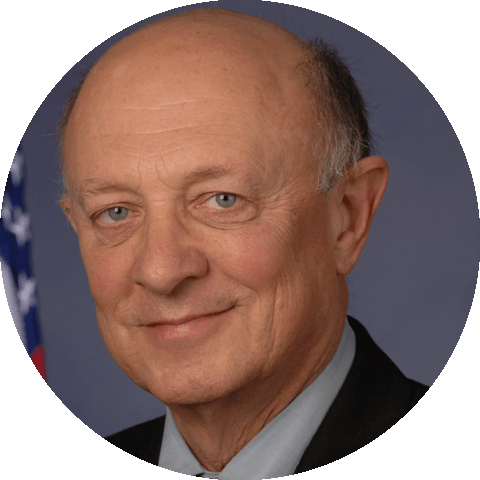
R. JAMES WOOLSEY
ADVISOR
R. James Woolsey, Jr., a former director of the U.S. Central Intelligence Agency, is Vice President at Booz Allen & Hamilton for Global Strategic Security. Previously, he was partner at the law firm of Shea & Gardner.
Besides serving as Director of Central Intelligence, Woolsey has served in the U.S. government as Ambassador to the Negotiation on Conventional Armed Forces in Europe (CFE), Vienna, 1989-1991, Under Secretary of the Navy (1977-1979), and General Counsel to the U.S. Senate Committee on Armed Services, 1970-73.
He was also appointed by the President as Delegate at Large to the U.S.-Soviet Strategic Arms Reduction Talks (START) and Nuclear and Space Arms Talks (NST) in Geneva between 1983 and 1986.
During his military service in the U.S. Army, he served as an adviser on the U.S. Delegation to the Strategic Arms Limitation Talks (SALT I), Helsinki and Vienna, from 1969 to 1970.
Woolsey is a former Rhodes Scholar, a graduate of Stanford University and a 1968 graduate of Yale Law School.
He is also a member of the Policy Advisory Board to the Secretary of Defense.
Woolsey is one of the signers of the January 26, 1998, Project for the New American Century (PNAC Letter) sent to President William Jefferson Clinton. He was also one of the signers of another PNAC document, Statement on Post-War Iraq, on March 19, 2003.
Woolsey represented the Iraqi National Congress.
Woolsey was a Commissioner on the National Commission on Terrorism which delivered the Report of the National Commission on Terrorism to President Bill Clinton in June 2000. At the time, he was a partner at the law firm of Shea & Gardner "with a practice in the fields of civil litigation, alternative dispute resolution, and corporate transactions."
Woolsey is connected with the Scowcroft Commission (also see Brent Scowcroft) and the Rumsfeld Commission (also see Donald H. Rumsfeld). He was chairman of Freedom House, reputed to be affiliated with the Council on Foreign Relations (of which he is believed to be a member), is on the board of the Jewish Institute for National Security Affairs (JINSA), a member of the Committee for the Liberation of Iraq, on the board of the Washington Institute for Near East Policy, a senior advisor for Americans for Victory Over Terrorism (AVOT), a advisory board member of Gatestone Institute, a member of Flynn Intel Group, a member of the Center for Security Policy, a advisor for Genie Energy and a principal in Paladin Capital Group. He is Vice President of Booz Allen & Hamilton, the lead contractor for the Total Information Awareness program.
Woolsey is Vice Chairman of the Advisory Board of Global Options, Inc./Global Options, Inc.. He also sits on the Board of the North American Industrial Hemp Council/North American Industrial Hemp Council.
Affiliations
Foundation for Defense of Democracies: Chair, Leadership Council
Set America Free:Founding Member
Committee on the Present Danger:Co-Chair
Jewish Institute for National Security Affairs:Member, Advisory Board
Institute of World Politics:Chancellor
Atlantic Council:Lifetime Director
Freedom House:Former Board of Trustees Chair
Center for Security Policy:Former Honorary Co-Chair of National Security Advisory Council
Coalition for Democracy in Iran:Supporter
Committee for the Liberation of Iraq:Former Member
Americans for Victory over Terrorism:Former Senior Advisor
National Institute for Public Policy:Study Participant
Project for the New American Century:Signatory, PNAC Advocacy Letters
Center for Strategic and International Studies, Former Trustee
Washington Institute for Near East Policy:Member, Advisory Board
Institute for the Analysis of Global Security:Advisor
NGO Monitor:Member, International Advisory Board
Jamestown Foundation:Former Board member
Fuel Freedom Foundation: Board Member
American Freedom Law Center: Member, Advisory Board
Government
National Commission on Energy Policy: Member
Defense Department: Defense Policy Board Member (2001-2005); Deterrence Concepts Advisory Panel: Member (2001-2003)
National Commission on Terrorism: Member (1999-2000)
Rumsfeld Missile Commission: Member (1998)
Central Intelligence Agency: Director (1993-1995)
Negotiations on Conventional Armed Forces in Europe: Ambassador and U.S. Representative (1989-91)
President’s Commission on Federal Ethics Law Reform: Member (1989)
President’s Blue Ribbon Commission on Defense Management (Packard Commission): Member (1985-1986)
U.S.-Soviet Strategic Arms Reduction Talks: Delegate at Large (1983-1986)
Nuclear and Arms Space Talks: Delegate at Large (1983-1986)
President’s Commission on Strategic Forces (Scowcroft Commission): Member (1983)
Department of the Navy: Under Secretary of the Navy (1977-1979)
U.S. Senate: General Counsel, Committee on Armed Services (1970-1973)
Strategic Arms Limitation Talks: Advisor, U.S. Delegation (1969-1970)
Business
Woolsey Group: Chair
Executive Action, LLC: Chair
Lux Capital: Venture Partner
BioDefense Corporation: Advisor
Booz Allen Hamilton: Former Vice President, Global Strategic Security Division (2002-2008)
Paladin Capital Group: Chair of Strategic Advisory Group
GridPoint: Board of Advisors
GreenZone: Member, Board of Directors
Vantage Point Venture Partners: Partner and Senior Advisor
Shea & Gardner: Former Managing Partner
Philadelphia Stock Exchange: Former Member, Board of Governors
Invicta Networks, Inc.: Board Member
Agorics, Inc.: Former Board
Linsang Partners, LLC: Former Board Member
BC International Corporation: Former Board Member
Fibersense Technology Corporation: Former Board Member
Sun HealthCare Group, Inc.: Former Board Member
Global Options LLC: Former Vice Chairman, Advisory Board
Martin Marietta: Former Board Member
Fairchild Industries: Former Board Member
DynCorp: Former Board Member
British Aerospace: Former Board Member
Titan Corporation: Former Board Member
Yurie Systems, Inc.: Former Board Member
USF&G: Former Board Member
Aerospace Corporation: Former Director
Fuels for Global Energy Markets: Member, Strategic Advisory Board
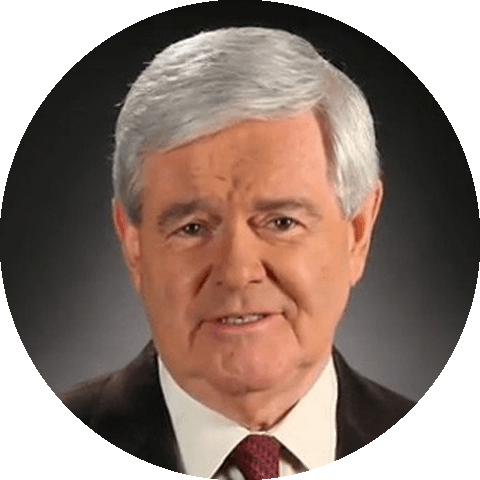
NEWT GINGRICH
ADVISOR
(born June 17, 1943) is a neoconservative politician who is best known as the Speaker of the U.S. House of Representatives from 1995 to 1999. As a co-author of the notorious 1994 Contract With America, Gingrich was in the forefront of the Republican Party's success in the 1994 Congressional elections, and was subsequently elected Speaker. After he returned to private life, Gingrich remained active in neoconservative politics, becoming a fellow at both the American Enterprise Institute (AEI) and the Hoover Institution, two of the big guns in the neoconservative think tank world.
He is also Worked on "War on Terror" topics as a member of the Council on Foreign Relations.
Gingrich also founded the Gingrich Group, which, according to his personal website, is "a communications and consulting firm that specializes in transformational change", and the Center for Health Transformation, a Gingrich Group project launched in 2003.
Gingrich, a "well-paid broker of ideas and influence in the field of health care policy. ... has become probably the most visible spokesman for a set of ideas about health care that is gaining support in the Bush administration and in business," the New York Times said in January 2005.
With the election of George W. Bush, Newt Gingrich was tapped to serve on the Pentagon’s Defense Policy Board, a think tank for the U.S. Department of Defense dominated by neoconservatives and criticized because of the perceived conflicts of interests of its members, many of whom have strong ties to defense contractors that could benefit from sensitive information gleaned at policy board meetings. Gingrich is one of only eight Hoover fellows with seats on the 31-member board.
ALEC
The American Legislative Exchange Council became the nation’s best-known “model”-bill factory over its four decades by providing more than fill-in-the-blank legislation.
The industry-sponsored group has weathered controversy and flourished because it also offers conservative Republican elected officials a social network, access to campaign donors and a blueprint for how to accelerate their political careers.
Gingrich has called ALEC “the most effective organization” at spreading conservatism and federalism to state lawmakers.
Paul Weyrich
Gingrich was cultivated by Heritage Foundation and Moral Majority founder and Council for National Policy member Paul Weyrich. By 1978, Weyrich's PAC helped sweep into Congress a new, radical breed of populist conservatives. The most notable, it turned out, was a brash, young man from Georgia named Newt Gingrich whom Weyrich had trained years earlier at a campaign seminar in Milwaukee. (source)
Committee on the Present Danger
Gingrich is a part of the discredited military industrialist fear mongering lobby group known as the Committee on the Present Danger. The group was born out of the Soviet era Team B who were known as exaggerating the Soviet threat and capabilities. Their lies were exposed after the fall of the USSR and the group went into obscurity. In more recent times they have emerged as the Committee on the Present Danger and operate as an extension of the Center for Security Policy (CSP). The group have been engaged in fringe media outlets promoting their theoretical EMP nuclear attack threats from North Korea and Iran. Many of the doomsday cultist End Times media outlets have been receptive to these theories. Since around the Trump presidency the China fear mongering has been their key focus.
Affiliations
American Solutions for Winning the Future: Chairman
Renewing American Leadership: Founder
Committee on the Present Danger: Member
American Enterprise Institute: Former Senior Fellow
National Defense University: Visiting Scholar
Council on Foreign Relations: Terrorism Task Force
Foundation for the Defense of Democracies: Member, Leadership Council
Hoover Institution: Former Visiting Fellow
West Georgia College: Professor of History and Environmental Studies
Committee for the Liberation of Iraq: Advisory Board, Former Member
Fox News: Political Analyst
Barrick Gold Corporation: International Advisory Board member
VitalSpring Technologies, Inc.: Member of Board of Advisors
Golden Spike Company and Forstmann Little & Co.: Member of Board of Advisors
H. Lee Moffitt Cancer Center & Research Institute: Member of the Advisory Board
Pathway Genomics Corporation: Member of the Strategic Advisory Board
Government
Defense Policy Board: Member (2001-2009)
U.S. Commission on National Security-21st Century (“Hart-Rudman Commission”): Former Member
U.S. House of Representatives: (R-GA) Speaker, 1995-1999; Member, 1979-1999
Internet Policy Institute: Board Member
Trump Transition Team, Vice Chair
Business
Gingrich Consulting: Founder
NanoBusiness Alliance: Honorary Chairman
Center for Health Transformation: Founder
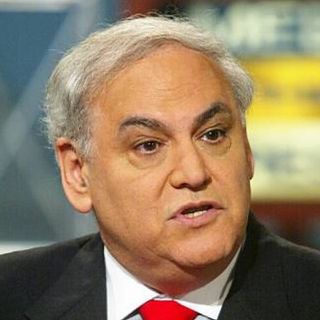
RICHARD PERLE
ADVISOR
(born September 16, 1941) Perle was Assistant Secretary of Defense for Global StrategicAffairs under Reagan.
He began his political career as a senior staff member to Henry Jackson on the Senate Armed Services Committee. He was brought in by Albert Wohlstetter.
He attended school with Joan Wohlstetter (the daughter of Albert and Roberta Wohlstetter of the RAND Corporation)
Resident Fellow of American Enterprise Institute (AEI)
Advisory Board of the Center for Security Policy
PNAC, JINSA, Steering Committee of the Bilderberg Group.
Patron of Henry Jackson Society.
Leader of a group that created the Clean Break strategy for Netanyahu.
Believed to be part of the “X Committee” spy ring providing information
including top secret code numbers of classified military documents to
Jonathan Pollard.
An FBI summary of a 1970 wiretap recorded Perle discussing classified information with someone at the Israeli embassy.
Received substantial payments to represent the interests of Soltam,an Israeli
weapons company. He recommending that the Army purchase an armaments
system from Soltam that earlier had paid him $90,000 in consulting fees.
Drafted the Jackson-Vanik amendment that resulted in the Jewish-Russian
mafiya infiltration of the United States.
The day after 9/11 in a completely unscheduled encounter with George Tenet,
Perle told him that ”Iraq must pay for 9/11” It was the first conservation Tenet
had encountered that suggested Iraq had a link to 9/11.
Coauthored The End of Evil with fellow neoconservative David Frum in 2004.
The book criticizes American bureaucracy, civil service and law. The book suggests that US must ‘overhaul the institutions of our government to ready them for a new kind of war against a new kind of enemy.’’including FBI, CIA, armed forces and State Department.’ The book promotes the Iraq War and defends the 2003 invasion despite the false premises for it. The book also discusses ways to abandon all Israeli-Palestinian peace processes, invade Syria, implement strict US domesticated surveillance with biometric identity cards.
In dramatic fear mongering hegellian dialectic the book states ‘There is no middle way for Americans: It is either victory or holocaust.’
Hollinger International
Served as a director for Hollinger International Inc.
On August 31, 2004, a special committee of new Board of Directors investigating the alleged misconduct of the controlling shareholders of Hollinger International submitted the 512-page Breeden Report to the U.S. Securities and Exchange Commission (SEC). In the report, Perle is singled out as having breached his fiduciary responsibilities as a company director by authorizing several controversial transactions which diverted the company's net profit from the shareholders to the accounts of various executives.
Perle siphoned $2.5 million out of Hollinger International Inc disguised as an investment to a company Perle co-founded with Gerald Hillman called Trireme Management Group. The transaction wasn't reported to the audit committee.
The Breeden report said Perle "breached his fiduciary duties" as a member of the board's executive committee, signing documents without evaluating or, sometimes, reading them, including those that allowed Black and Radler to evade audit committee scrutiny. Perle received more than $3 million in bonuses and hundreds of thousands of dollars more in compensation from a Hollinger subsidiary that invested in new media companies during the dot-com boom. The report said Hollinger International put $63.6 million into 11 companies Perle recommended and lost nearly $50 million. "Perle was a faithless fiduciary . . . and . . . should not be allowed to retain any of his Hollinger compensation," the report said. The investigating committee called for him to return the $5.4 million.
Top Hollinger executives dismissed the Breeden Report and filed a defamation lawsuit against the head of the investigating committee, former SEC chairman Richard C. Breeden. However, in 2005, Perle publicly acknowledged he had been served a 'Wells notice', a formal warning that the S.E.C.'s enforcement staff had found sufficient evidence of wrongdoing to bring a civil lawsuit.
Kissinger
Not only was Perle a friend of Kissinger, he was also a business associate as Kissinger was also a member of Trireme Management Group. At the same time Perle, Hillman and Kissinger were advisers of the US Secretary of Defense by being members of the Defense Advisory Board chaired by Perle. All three men also served as advisors or directors at Hollinger International Inc.
Boeing
Boeing kick-started Trireme Management Group with a $20 million investment. Interestingly, Boeing are the second biggest defense contractor and following their investment, Perle wrote op-eds supporting Boeing's controversial $17 billion tanker contract with the Pentagon. and also called for a preemptive strike on Iraq.
Soltam controversy
According to the New York Times Shlomo Zabludowicz and his son, Chaim Zabludowicz, became clients of Perle in 1980.
They paid $90,000 to the Abington Corporation, a consulting company where Mr. Perle worked that was owned by John F. Lehman Jr., later the Secretary of the Navy.
It was not until January 1982, nine months after Mr. Perle says the Zabludowiczes stopped being his clients, that he settled his financial arrangements with Mr. Lehman and Abington and received a portion of the $90,000 fee from 1980. The $50,000 Mr. Perle received in March 1981 was in addition to his share of the Abington fee.
Saudi scandal
In March 2003, Perle became embroiled in controversy after The New Yorker published an article by Seymour Hersh. The article described a meeting between Perle, the arms dealer Adnan Khashoggi, and Saudi businessman Harb Zuhair, in which Perle allegedly offered to influence American foreign policy in Saudi Arabia in exchange for investment in Trireme. The U.S. Department of Defense Inspector General investigated the conflict of interest and determined that Perle did not violate the conflict of interest provision because he was only working eight days per annum at the Defense Department at the time, which was less than the 60 days of service requirement.
Yugoslavia
On CNN's Crossfire in August 1992, Perle said he favoured a no-fly zone in Bosnia. In December 1992, he told CNN, the arms embargo was making the situation worse.
Perle was one of 100 conservative figures led by Margaret Thatcher and George Shultz who signed an open letter to President Bill Clinton on 1 September 1993, calling for air strike and military aid to the Bosnians.
In February 1994, Perle spoke at the Munich Security Conference, in the wake of a Serbian attack on Sarajevo market. Speaking immediately after Defence Secretary William Perry, Perle repeated his call for air strikes and the lifting of the arms embargo on the Bosnian Muslims.
In a New York Times op ed co-authored with Richard Burt, Perle wrote:
We should move immediately to revise the U.N. embargo that has kept the Bosnian Muslims outgunned and under siege. With Bosnia excluded from the embargo, the U.S. and others should supply essential arms to the Bosnian Government. Then Bosnian troops would have a decent chance of achieving defensible borders.
Second, we should plan to use NATO air power not only against tactical targets in Bosnia, like the artillery positions surrounding Sarajevo, but also against strategic targets in Serbia itself. Precise attacks by advanced weapons could cripple air bases and military logistics centers, or Belgrade's power supply, while posing little threat to civilians.
In December 1994, Perle joined a call by the Action Council for Peace in the Balkans for the United States to lead and organize action to disrupt the Serbian attack on Bihac in northwestern Bosnia by the use, if necessary, of U.S. air power.
In a July 1995 Washington Post op ed, Perle supported a legislative proposal by Robert Dole, and Joe Lieberman to require President Clinton to end U.S. participation in the U.N. embargo barring the supply of arms to the government of Bosnia.
Later that month he reportedly warned that the US had an important geopolitical interest in protecting Muslims from attack:
Of all the ways that this post-Cold War world could turn very sour, and one of the most worrisome is if you get a kind of holy feud between the world of Islam and the non-Islamic world.
And at the moment, Muslims look at what's going on and believe that they're being victimized because they're Muslims, he said. I think that's very dangerous.
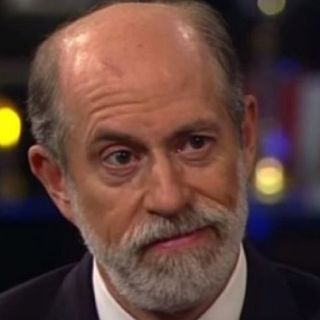
FRANK GAFFNEY JR.
ADVISOR
President and Founder of Center for Security Policy (CSP) Council for National Policy (CNP), Project for a New American Century (PNAC) Jewish Institute for National Security of America (JINSA) member Gaffney is a contributor and contributing editor for a number of publications, including the Washington Times, National Review Online, WorldNetDaily, Jewish World Review., Breitbart and Horowitz’s FrontPage Magazine. He also co-authored book with David Horowitz.
Frank J. Gaffney, Jr. has been called one of the "key ideologues who are the nerve center of the Islamophobia network" and is founder and president of the Center for Security Policy, a non-profit think tank "funded mainly by U.S. defense contractors (Boeing, Lockheed Martin, General Dynamics, Northrop Grumman, CACI International) , old money industrialist foundations (Bradley Foundation, Templeton Foundation, Olin Foundation), and right-wing Zionists (Nina Rosenwald, The Rennerts)" Gaffney is a long term neoconservative.
Trump administration
Since 2017 several people with ties to the CSP have joined the Trump administration, including Counselor to the President Kellyanne Conway in 2017, chief of staff for the National Security Council Fred Fleitz in 2018, and Deputy National Security Advisor Charles Kupperman in 2019. Kupperman served on the board of directors for CSP between 2001 and 2010.
The Trump administration used reports released by the CSP when it proposed to ban all Muslims from entering the United States.
Fear Inc
The Center for American Progress report "Fear, Inc.: The Roots of the Islamophobia Network in America" calls Gaffney a key ideologue in the Islamophobia network "responsible for originating and manufacturing the intellectual arguments, rhetoric, and talking points" used to spread anti-Islamic falsehoods.
Obama "Birther" Conspiracy Theories
Prominent voices within the Gaffney's circle popularized the "Birther" conspiracy asserting that Obama was born in Kenya. The birther accusations about Barack Obama’s eligibility to serve as president were the issue that catapulted Donald Trump onto the political landscape.
Obama Administration "Submission to Islam" Based on Missile Defense Logo
In February 2010, Gaffney alleged the Obama Administration had been infiltrated by Islamists and "is all about accommodating that “Islamic Republic” and its ever-more aggressive stance," based on the fact that the new logo for the Missile Defense Agency "appears ominously to reflect a morphing of the Islamic crescent and star with the Obama campaign logo."
Missile Defense Agency spokesman Rick Lehne told The Washington Post: This was a logo that was developed three years ago for our recruiting materials and our public Web site. It did not replace our official MDA logo, and of course it has no ties to any political campaign. It was done one year before the 2008 elections. So the whole thing is pretty ridiculous.
Military industrial complex shill Gaffney said "Team Obama’s anti-anti-missile initiatives are not simply acts of unilateral disarmament of the sort to be expected from an Alinsky acolyte. They seem to fit an increasingly obvious and worrying pattern of official U.S. submission to Islam and the theo-political-legal program the latter’s authorities call Shariah." This incredible statement considering Obama not only signed off on many new military projects involving developing new missiles for
12 ballistic missile submarines, missiles for the F-35 and the Air Force was awarded a contract for a new bomber program, known as a long-range strike bomber
but his well documented drone program targeted Muslims.
Another interesting correlation to President Donald Trump is the he used similar talking points portrayed the country’s military spending as woefully inadequate under the Obama administration.
The Committee on the Present Danger
The Committee on the Present Danger is an extension of Gaffney's Center for Security Policy. Gaffney serves as co-chair of the most recent version - Committee on the Present Danger China. Other members of the committee include FDD Advisors Newt Gingrich, R. James Woolsey and Sen. Joe Lieberman.
Background
Gaffney was originally brought into politics via Henry "Scoop" Jackson. From 1983-1987 he was Deputy Assistant Secretary of Defense Nuclear Forces and Arms Control Policy under Richard N. Perle who worked under Jackson and in April 1987 Gaffney became Assistant Secretary of Defense for International Security Policy. Gaffney is the former chairman of the High Level Group at NATO.
American Enterprise Institute
By February 1988, Gaffney had moved to the American Enterprise Institute.[23] That month, he took part in an AEI review of the INF Treaty with Perle, Douglas Feith, Michael Mobbs and Seymour Weiss. Their analysis concluded that effective verification of the agreement was nearly impossible.[24] Also that month, conservative Senator Gordon Humphrey demanded that Perle and Gaffney be included in Senate hearings on the treaty.
In March 1988, Perle and Gaffney wrote to members of Congress opposing an agreement to allow Japan to obtain plutonium from US nuclear waste.
Hudson Institute
By May 1988, Gaffney had become a senior fellow at the Hudson Institute.
In October 1988, Gaffney warned against "the almost naive notion that peace is breaking out all over" because of Soviet peace initiatives.
"I personally believe it is a very thoughtful, carefully tailored and quite cynical effort (by Moscow) to promote precisely that impression, not just in the United States, but in Germany and rest of the Western world," he said in a telephone interview from Washington, D.C.
In December 1988, Gaffney outlined his view of the threats facing the US to the AEI's annual policy conference:
I think, to a very considerable degree, the ability of a democracy like ours to meet its requirements of a global nature is a direct function of the perception, public popular perception in particular, of the degree to which those interests are threatened. As the perceived threat diminishes, irrespective of the actual threat -- as the perceived threat diminishes, generally speaking so does the priority accorded to resources made available to deal with that threat. And there are two important, hardly exclusive, but two important trends that are at work at the moment that infinitely complicate the task of ensuring the public properly understands the threat, properly perceives the threat. The one which Judy alluded to at the outset is, obviously, the very vigorous campaign being waged with considerable success by Mikhail Gorbachev, aimed at, as Georgi Arbatov let slip recently, denying us an enemy.
In January 1989, Gaffney criticized the Reagan administration's attempts to negotiate a ban on chemical weapons:
I think in a world in which we live, not the world necessarily we would like or the world that we could imagine and certainly the world that our negotiators will try to negotiate. We are going to have to have a continuing capability in this country to deter the use of chemical weapons against us and or allies and that means not giving up our own stockpile, modest though it is, of chemical weapons and, in fact, taking modest steps to modernize it.
In a March 1989 Brookings Institute seminar, Gaffney argued that the Soviet Union would continue to seek hegemony on the Eurasian landmass:
"It remains to be seen whether we can continue to defeat them in that objective, which I think is vital to our interest as well as that of Western Europe, now that we are facing a more subtle political and military agenda on the part of Mr. Gorbachev and the Soviet leadership. I think the Soviet interests, through arms control, through seduction, through economic entrapment, and other means of obtaining that objective, is unflagging. And we would be very poorly served if lose sight of that."
In May 1989, Gaffney criticized West German opposition to the modernization of the Lance short range missile. ]A month later, tensions were reported within the Bush administration ahead of strategic arms reduction talks in Geneva:
The Pentagon's office of international security policy is packed with holdovers from the most hard-line elements of the Reagan administration. Its top civilians in charge of arms control, Mark Schendier and Bob Joseph, are proteges of Richard Perle and Frank Gaffney, the leading arms control hard-liners while Caspar W. Weinberger was Reagan's defense secretary.
One top Pentagon official said: "We don't have arms controllers in the Department of Defense. We have antiarms controllers."
In August 1989, Gaffney issued a CSP report calling for a moratorium on trade liberalization with the Soviet Union, following the launch of an intelligence investigation into Felix S. Bloch, an official at the Stated Department's European Affairs Bureau. The report was endorsed by former government officials William Schneider, Kenneth deGraffenreid and Roger Robinson.
In September 1989, Gaffney told the Washington Times that President George H.W. Bush would nominate R. James Woolsey as a strategic arms negotiator in an attempt to reach out to Congressional Democrats. In the same article, Richard Perle said he would not object to the nomination.
In October, Gaffney noted that Bush officials had adopted a more positive tone towards perestrioka compared to the early months of the administration:
"The rhetoric was more cautious and more restrained, certainly than it is now. I think the actual policy that was being put into place was more consistent" with the current tone of administration statements, Mr. Gaffney said. He called the latter "a corrective action to bring the rhetoric into line with the policy."
Gaffney's Center for Security Policy released a position in November, which warned that a December summit would see Gorbachev demanding increased western support while cracking down on democratization at home.
"Gorbachev is saying that events in the U.S.S.R. and Eastern Europe are making Soviet repression inevitable," Mr. Gaffney said. "Evidently the administration is disposed to view repressive actions as necessary - and by definition, acceptable - evils on the road to reform."
"What worries me is that we've begun to substitute the idea of helping Gorbachev for the idea of promoting change in the Soviet Union," Gaffney told Business Week, in an article which suggested that hardliners in the administration included Dick Cheney and Robert Gates.[38] He reiterated this view in December, at an AEI policy conference on Arms control, where he spoke alongside Kenneth Adelman, Stephen Hadley and Patrick Glynn.
Gaffney was criticial of the outcome of the Malta summit:
"Mr Bush has precious little to show for his new commitment to a partnership with the Soviets - except the promise of new financial liabilities for US taxpayers in rescuing Moscow's failed economy, a continuing Soviet-sponsored effort to destabilize the Western Hemisphere and the looming prospect of a raft of arms control agreements that will be neither carefully prepared, nor effectively verifiable nor in the interest of the US.
The Guardian's Martin Walker suggested that such views reflected a conservative constituency that Bush was not strong enough to ignore, and which was represented by administration figures such as Cheney.
With the iron curtain crumbling, Gaffney gave his view of what America's response should be in January 1990.
Very quickly, the key elements of our policy at this point, I think must be to maintain the defense structure that we have, including our Alliance arrangements. I think at least until we see what emerges from this devolving Soviet Union, that is the only appropriate policy. The corollary to that is that we must go slow on arms control, not accelerate it in order to make deals with Gorbachev while he lasts, which appears to be the Bush administration's policy. It's striking that in the Conventional Forces in Europe talks, the CFE talks, the outcome of doing so may well be to give a legitimacy, as Chris mentioned the Helsinki agreement did, to the Soviet presence in Eastern Europe that none of the East Europeans seem to wish to have.
Later that month, Gaffney said that plans to relax COCOM restrictions would be "a significant infusion of high-technology to the military sector of the Soviet Union". He reiterated the point in March:
"I'm afraid the biggest beneficiary of all this tech trade will be the Soviet military," says Frank Gaffney, a former deputy assistant Defense secretary. "The guy on the street in Poland won't be buying our computers. He can't even afford a loaf of bread."
Gaffney also spoke out against plans for a fibre-optic link with the Soviet Union.
"A Soviet fiber-optic network will . . . make it infinitely more difficult for the West to monitor Soviet communications, a decisive factor assessing leadership intentions, status of forces and preparations for conflict."
When an Iraqi weapons procurement program was broken up in Britain in 1990, Gaffney Commented "There is no doubt these weapons are aimed against Israel. But that's not the only target."
For Gaffney, the Iraqi successes reveal the control regime's shortcomings more than its failure. "Since we cannot stop the proliferation of missile technology, we should deploy anti-ballistic missile systems" such as the joint U.S.-Israeli "Arrow" project, Brilliant Pebbles (an SDI concept), and a ground-based point defense system, Gaffney argues. "These would be an infinitely more powerful disincentive than MTCR to any government thinking of investing a significant portion of its treasury in acquiring missile technology."
When the USSR cut off supplies to Vilnius following its unilateral declaration of independence, Gaffney said it was a "scam" to believe the USSR would ever let the country go. "Bush's inability even to impose 'Potemkin' economic sanctions in response to Gorbachev's crackdown on Lithuania amounts to writing a blank check,", he said.
Following the murder of Dr Gerald Bull, Gaffney suggested Bull's illicit arms trading might have been overlooked:
"The truth is the administration of export controls from this country is a sometime thing," he said. "When you talk about policing exports from third countries, it's a very erratic thing." But "there is always the possibility we or other countries were looking the other way," he added.
In an April 1990 commentary for the Washington Times, Gaffney attacked attempts to cancel the V-22 Osprey program, which he called "the most promising aerospace development since the invention of the jet engine".
In May 1990, Gaffney criticized negotiations to remove short-range nuclear weapons from Germany.
"This administration has been too willing to give away things it doesn't have to," said Frank Gaffney, president of the Center for Security Policy. "The Soviets are in the position of a river boat gambler. They have no cards, and unfortunately they are likely to get the pot."
Affiliations
According to the Modern History Project, the following are Gaffney's affiliations:
American Committee for Peace in the Caucasus
Center for Security Policy
Council for National Policy
Committee on the Present Danger - Member
Family Security Matters – member, board of advisors (dates uncertain)
Foundation for the Defense of Democracies - Distinguished Advisor
Georgetown University – B.A. Foreign Service
Project for the New American Century - Signatory
School of Advanced International Studies (SAIS) – M.A. International Studies
United States Committee for a Free Lebanon - 'Golden Circle' supporter
United States Department of Defense – Officer of, 1983 to 1987; Deputy Assistant Secretary of Defense for Nuclear Forces and Arms Control Policy (Reagan administration)
United States Legislative Branch – Officer of, 1981 to 1983; Staff Member, Senate Armed Services Committee
Zionist Organization of America
Center for Security Policy - Contributor to CSP front group Family Security Matters.
He is a proponent of a new version of the infamous House Un-American Activities Committee to root out suspected Muslim subversives.
Other affiliations include:
Committee for Peace and Security in the Gulf, Signatory February 1998 letter
Middle East Forum - Study Participant, May 2000
Coalition for Liberty, Security, and the Law - Signatory
Washington Times - Columnist
Defense News - Monthly Contributor
Investor's Business Daily - Monthly Contributor
Benador Associates - Expert Speaker
Ariel Center for Policy Research - Contributing Expert
National Review Online - Contributing Editor
Americans for Victory over Terrorism - Former Senior Advisor
Set America Free Coalition - Member
International Free Press Society - Board of Advisors
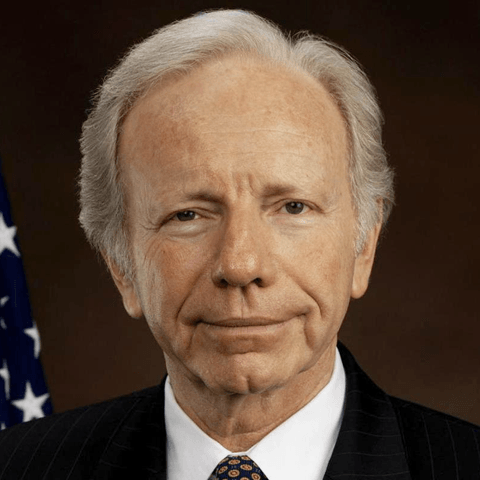
JOE LIEBERMAN
ADVISOR
United Against Nuclear Iran:Chairman
American Enterprise Institute: Project Co-Chair
U.S. Senator (D, I-CT) (1989-2013)
Board member of The Israel Project
Chairman of the Center for Jewish and Christian Values, which is a part of the IFCJ (International Fellowship of Christians and Jews).
Advisor for FDD
Co-chairman of American Internationalism Project at the American Enterprise Institute (AEI) think tank.
Former Sen. Joseph Lieberman, regarded as the “Republicans’ favorite Democrat” because of his neoconservative foreign affairs agenda, represented Connecticut initially as a Democrat and later as an “Independent Democrat.” First elected to the Senate in 1988, Lieberman retired at the end of his term in 2013.
In the Senate, Lieberman regularly teamed up with like-minded Republican colleagues—notably Sens. John McCain, Lindsey Graham, and Jon Kyl—to promote militarist security policies. He earned a reputation as a foreign policy hawk for his outspoken support for the war in Iraq and for his consistent collaboration with neoconservative-led advocacy groups pushing for interventionist policies in the Middle East.
Since leaving office, Lieberman has continued his foreign policy advocacy, joining numerous neoconservative groups, in particular the American Enterprise Institute (AEI), where he co-chaired with former Senator Kyl its American Internationalism Project, a purportedly cross-party initiative meant “to rebuild and reshape a bipartisan consensus around American global leadership and engagement.” His tenure at AEI, wrote one commentator, allowed Lieberman “to pontificate to a sympathetic audience about why he regards even mild opposition to his intransigent bellicosity as benighted obstructionism.”
Lieberman has also worked with the Washington Institute for Near East Policy, a spinoff of the American Israel Public Affairs Committee (AIPAC), where he became a member of its board of advisors in January 2013; the Jewish Institute for National Security Affairs, where he become a member of the advisory board; and the Hudson Institute, where he co-chaired the “Blue Ribbon Study Panel on Biodefense.” In November 2013, Lieberman joined the Center for a New National Security (CNAS) as a member of its board of directors.
In 2015, Lieberman joined the advisory board of an AIPAC-backed lobbying organization, Citizens for a Nuclear Free Iran (CNFI). Lieberman’s affiliation with the group elicited criticism in part because of his support for the Mojahedin-e Khalq (MEK), a controversial Iranian opposition group which until 2012 was on the State Department’s list of terrorist organizations. Citizens for a Nuclear Iran subsequently removed references to Mojahedin-e Khalq from its website.
Lieberman is currently chairman of the Sheldon Adelson-backed United Against Nuclear Iran (UANI). He replaced Gary Samore after the latter stepped down in 2015 and announced his support for the nuclear deal with Iran. Said Lieberman at the time: “UANI has led the effort to economically isolate the Iranian regime, and its bipartisan and international expertise makes it a highly respected voice on the merits of the Iran agreement. I am honored to assume this new leadership role at this important time.”
Since the 2016 election of Donald Trump, Lieberman has been both critical and supportive of the administration. While he ridiculed Trump’s call to force Mexico to pay for the construction of a border wall, Lieberman has lauded his “sea change” on Iran policy. In a February 2017 media interview, Lieberman urged Trump not to “tear up” the agreement but to closely monitor Iran to see if they are not complying and “and if they don’t comply, then we can break out of the agreement.” After Trump’s controversial firing of FBI Director James Comey in May 2017, Lieberman was briefly considered a leading candidate for the post.
Lieberman—who promised during his Senate career that he would never become a lobbyist[8]—has worked as a lobbyist since retiring fro the Senate. Lieberman’s lobbying efforts form part of his work as senior counsel for Kasowitz Benson Torres & Friedman, a national law firm Lieberman joined in June 2013 and whose lobbying operation is headed by Lieberman’s former chief of staff. As of 2017, Lieberman was listed as being “senior counsel” at the law firm.
Opposition to Iran Diplomacy
Lieberman actively advocated against the nuclear negotiations between Iran and six world powers, which led to the historic July 2015 agreement between Tehran and the P5+1 group of nations. He argued that “no deal” with Iran would have been a better option for the United States than a “bad deal.” He wrote in a July 2014 op-ed: “Rather than being a defeat for the United States, a refusal to accept a bad deal in Vienna could strengthen the Obama administration at home and abroad. It would help rebuild its bruised credibility and influence in the Middle East and hopefully increase the odds that the administration can ultimately achieve the goal of peacefully, verifiably bolting the door on Iran’s illicit nuclear ambitions.”
Lieberman also strongly defended Israeli Prime Minister Benjamin Netanyahu’s controversial March 2015 speech to Congress criticizing the Obama administration’s negotiations with Iran. Leading up to the speech, Lieberman urged Democratic members of Congress to not skip Netanyahu’s address, saying: “Go because you know that Israel is one of our closest and most steadfast allies and you feel a responsibility to listen to its leader speak about developments that he believes could threaten the safety, independence and even existence of his country.”
In a March 2015 interview shortly before Netanyahu’s speech, Lieberman argued that Netanyahu wished to address Congress because he saw “echoes” of British Prime Minister Neville Chamberlain in President Obama’s approach to Iran. “I think there are echoes of this that I think Netanyahu hears and we ought to all hear so that we don’t repeat the worst experiences of history,” Lieberman opined.
After the comprehensive nuclear deal was reached with Iran in July 2015, Lieberman claimed that the United States had “conceded and conceded and conceded” to Iran and urged members of Congress to revoke the agreement. “I can’t think of a vote that I cast, apart from the ones deploying American troops into combat, that was as important as this agreement is to the future security of the United States,” Lieberman declared.
Shortly after the deal was announced, Lieberman joined the advisory board of a new AIPAC-backed lobbying organization, Citizens for a Nuclear Free Iran (CNFI). CNFI launched a multi-million dollar ad campaign against the Iran deal that was primarily aimed at Democratic constituencies in an effort to get Democratic votes in Congress to reject the deal. CNFI’s board of advisors has included several former Democratic members of Congress, including former Sens. Evan Bayh (IN), Mark Begich (AK), Mary Landrieu (LA), and former Rep. Shelley Berkley (NV). CNFI’s TV ads released after the July 2015 accords were described by prominent nuclear experts as “very misleading.”
After he became chairman of UANI in August 2015, Lieberman was appointed the chairman of the Sheldon Adelson-backed United Against Nuclear Iran (UANI), a UANI press release said the t“Senator Lieberman will play a key leadership role throughout UANI’s efforts to educate and inform the American public regarding the serious shortcomings of the Iran nuclear deal.” Commented one writer: “For those who are noting the overlap between Iraq war promoters and Iran deal saboteurs, Lieberman is your man.”
Senate Hawk on Syria and Iran
During his final term in the Senate, Lieberman was a vocal advocate for U.S. intervention in Syria’s civil war. In an August 2012 Washington Post op-ed coauthored with McCain and fellow hawk Sen. Lindsey Graham (R-SC), Lieberman called for the United States to arm select Syrian opposition groups and to provide air support for so-called “humanitarian safe zones” on Syria’s borders, despite arguments from many analysts that Syria’s conflict increasingly resembled a sectarian civil war and may have been infiltrated by foreign jihadists.
“The U.S. reluctance to intervene in Syria is, first of all, allowing this conflict to be longer and bloodier, a radicalizing dynamic,” they wrote. “Contrary to critics who argue that a greater U.S. role in Syria could empower al-Qaeda, it is the lack of strong U.S. assistance to responsible fighters inside the country that is ceding the field to extremists there.”
Earlier that year, McCain and Lieberman made a surprise visit to Free Syrian Army fighters on the Turkish border, where they declared that the conflict could only be resolved militarily. “Diplomacy with Assad has failed,” they said in a statement, “and it will continue to fail so long as Assad thinks he can defeat the opposition in Syria militarily.”
Lieberman was also among Congress’s most strident hardliners regarding Iran, pushing through new sanctions measures and advocating for an aggressive U.S. posture. In comments made at the neoconservative Foreign Policy Initiative shortly after the 2010 midterm elections, Lieberman asserted that Congress would pressure the Obama administration for more sanctions against Tehran and possibly military action. Arguing that he was skeptical that economic sanctions could prevent Iran from developing a nuclear weapon, Lieberman contended there was “broad bipartisan base of support” for taking military action against Iran.
In April 2006, Lieberman became the first prominent Democrat to announce his support for preemptive attacks against Iran to stop it from developing nuclear weapons. In an April 2006 interview with the Jerusalem Post, Lieberman said the aim of air strikes would be “to delay [the nuclear program] to deter it hoping that you set the program off course so that by the time they catch up back to where they were there’s been a change in government. That’s the limited objective that I would see.”
By mid-2007, Lieberman had expanded his agenda to include attacking sites in Iran near the border with Iraq. He argued the sites were being used to arm and train insurgents. Frustrated with the lack of political will in Washington to support U.S. strikes without sufficient proof of complicity of Iranian support for attacks in Iraq, Lieberman called on June 11, 2007, for a “strike over the border into Iran, where we have good evidence that they have a base at which they are training these people coming back into Iraq to kill our soldiers.”
In September 2007, Lieberman and Kyl cosponsored an amendment calling on the State Department to officially label the Iranian Revolutionary Guard Corps as a “foreign terrorist organization.” According to the Agence France Presse, the non-binding amendment, which passed 76-22, “says that senators agree it is in the critical national interest of the United States to prevent Iran turning Shia extremists in Iraq into a ‘Hezbollah type force.’”
Independent Democrat or Neoconservative?
Lieberman’s support for the Bush administration’s “war on terror” made him a target of antiwar Democrats, and he was eventually defeated during a 2006 Senate primary contest against Ned Lamont. However, Lieberman handily won the general election as an Independent. Some observers attributed the primary defeat to Lieberman’s Senate vote on June 22, 2006, in which he was one of only six Democratic senators to vote against two resolutions aimed at limiting U.S. involvement in the Iraq War.
Lieberman critics also frequently highlighted the senator’s cozy relationship with Republicans, who often lavished praise on the senator. In December 2005, for example, after Lieberman chastised Democrats for pushing for withdrawal from Iraq, both Vice President Dick Cheney and then-Secretary of Defense Donald Rumsfeld publicly extoled him. Said Cheney: “On this, both Republicans and Democrats should be able to agree. The only way the terrorists can win is if we lose our nerve and abandon our mission.”
In the run up to his 2006 primary election defeat, Lieberman announced that he would run as a “petitioning Democrat” during the main election, sparking widespread criticism from Democrats. Responding to the announcement, Markos Moulitsas, the founder of the Daily Kos blog, told the New York Times: “An interesting kind of ‘Democrat,’ Lieberman thinks he is. One who doesn’t respect the wishes of his state’s Democratic voters, one who will split his state’s vote on the left and potentially hand the election to a Republican.”
The election sparked a spirited debate over Lieberman and what his fate might mean for the Democratic Party. Some, like Marshall Wittmann, a fellow at the (now defunct) right-leaning Democratic Leadership Council (DLC) and the Progressive Policy Institute, contended that Kos and other “McGovernites with modems” are playing a dangerous game in attacking Lieberman, a game that ultimately plays into Republicans’ hands.
Harold Meyerson, editor-at-large of the left-leaning American Prospect, saw the issue a bit differently, writing in an op-ed for the Washington Post: “Lieberman’s ultimate problem isn’t fanatical bloggers, any more than Lyndon Johnson’s was crazy, antiwar Democrats. His problem is that Bush, and the war that both he and Bush have championed, is speeding the ongoing realignment of the Northeast. His problem, dear colleagues, is Connecticut.”
In one of his first moves after winning the 2006 midterm, Lieberman announced that his new spokesman would be Wittmann, whom the New York Times characterized “one of the great ideological contortionists.”
An idiosyncratic ideologue associated with a bewildering array of political factions—including the Trotskyites, the neoconservatives, the Christian Coalition, and various Republican politicians—Wittmann promoted efforts to push hardline policies in the Democratic Party as a senior fellow of the Progressive Policy Institute and the DLC. In a press release regarding Wittmann’s appointment, Lieberman said: “There is no better person to take the helm during this new time in my Senate career than Marshall. Marshall has been a trusted outside adviser to me for some time now and I’m glad he will be bring his experience and wisdom to my staff. Those qualities, along with his independence and diverse background, make him the ideal captain of my new Senate Communications team.”
History of Neoconservative Advocacy
Throughout the 1990s, Lieberman supported Republican-led initiatives to ramp up efforts to build a missile defense system, becoming one of only a handful of Democrats to vote in 1995 against cutting spending for space-based missile defense programs. In 1998, he cosponsored with McCain the Iraq Liberation Act, which made the overthrow of Saddam Hussein an official goal of U.S. policy.
In 2002, Lieberman became an honorary co-chair, along with George Shultz and Sen. John McCain (R-AZ), of the Committee for the Liberation of Iraq, an advocacy outfit spearheaded by a number of neoconservative stalwarts, including Jeane Kirkpatrick, William Kristol, Robert Kagan, Richard Perle, James Woolsey, and Eliot A. Cohen. According to the group’s mission statement, “The Committee for the Liberation of Iraq was formed to promote regional peace, political freedom, and international security by replacing the Saddam Hussein regime with a democratic government that respects the rights of the Iraqi people and ceases to threaten the community of nations.”
In 2004, Lieberman helped revive the Cold War-era anti-communist group, the Committee on the Present Danger (CPD), which Lieberman then co-chaired with Woolsey, Sen. Jon Kyl (R-AZ), and George Shultz. Among the familiar names on the CPD’s list of members were Frank Gaffney, Jack Kemp, Forbes, Gingrich, and Kirkpatrick. Reflecting the trend of similar neoconservative-aligned initiatives, the CPD also enlisted a number of well-known liberal figures, including Vaclav Havel and Elie Wiesel, giving the CPD a patina of nonpartisanship. At the June 2004 press conference announcing the rebirth of the CPD, Lieberman claimed the aim of the group was “to form a bipartisan citizens’ army, which is ready to fight a war of ideas against our Islamist terrorist enemies, and to send a clear signal that their strategy to deceive, demoralize, and divide America will not succeed.”
Lieberman also teamed up with Lynne Cheney , spouse of Vice President Dick Cheney, in 1995 to set up the private American Council of Trustees and Alumni (ACTA), which in 2000 gave $3.4 million to colleges and universities. While its various boards and advisory committees include elites from a diverse array of backgrounds, it has also had a number of neoconservatives, like Irving Kristol , Martin Peretz, Philip Merrill , William Bennett , Donald Kagan , Gertrude Himmelfarb , Hillel Fradkin , and Leon Kass.
In October 2001, ACTA issued a report assailing the response of U.S. universities to the 9/11 attacks, attacking dozens of college professors and students for their supposedly less-than-patriotic reactions to the terrorist attacks. Several months later in February 2002, ACTA issued a “revised and expanded” edition, which included “a sampler of the many responses” to the original report. The revised edition, authored by ACTA staff, claims in its “Acknowledgements” that “no public official—including Lynne Cheney and Sen. Joe Lieberman—has endorsed or been asked to endorse this report.”
The revised report was a compendium of some 100 statements recorded by ACTA that reveal what it purported to be “moral equivocation” and outright hostility toward the United States among academic elites. Such statements included: “Just because a grotesque act was committed against this country, does not mean any response is justified; it does not grant this country special license to use the sword;” “[Americans should] bring ourselves and our country to justice, not just the perpetrators;” and, “War created people like Osama bin Laden, and more war will create more people like him.” While the original version cited the names of particular professors, leading to charges that the report resembled a blacklist, the revised edition suppressed the names “to focus discussion on the content of the views expressed, rather than the individuals who expressed them.” Also excised in the new edition were a number of scathing judgments from the original that were cited in press reports, such as the charge that “colleges and university faculty have been the weak link in America’s response” to the attacks, and “when a nation’s intellectuals are unwilling to defend its civilization, they give comfort to its adversaries.”

GARY BAUER
ADVISOR
(born May 4, 1946) is an American civil servant, activist, and former political candidate. He served in President Ronald Reagan's administration as Under Secretary of Education and Chief Domestic Policy Advisor, and later became president of the Family Research Council and a senior vice president of Focus on the Family, both conservative Christian organizations. Bauer was a candidate in the 2000 Republican Party presidential primaries and participated in five national debates. He is known for his advocacy of religious liberty, support for Israel, and his dedication to electing conservative candidates to Congress.
Currently, Bauer is president of the advocacy organization American Values. In May 2018, President Donald Trump appointed him to the United States Commission on International Religious Freedom.
Media activities
Bauer co-hosted a talk radio show with former Jerusalem Post CEO and President Tom Rose from March 2006 to March 2007 on WMET, a Washington, D.C. metropolitan area radio station. Bauer is also a frequent guest on many conservative talk-radio programs across the country. Gary and Tom have been co-hosts on SiriusXM Patriot Channel 125 Bauer and Rose Show for 9 years and their popular show ended April 9, 2017 with Tom Rose taking a position in the White House as assistant and adviser to Vice President Pence
African American Republican Leadership Council : May be on Advisory Council
American Alliance of Jews and Christians : Co-founder, 2002
American Renewal : Former chairman
American Values : Founder, President
Arlington Group
Beliefnet : Columnist
Campaign for Working Families : Co-founder, Chairman
Christians United for Israel
Council for National Policy : Member
Family Research Council : President, 1988-1999
Focus on the Family : Vice President, 1988-1992
Foundation for the Defense of Democracies : Board of Advisers
International Fellowship of Christians and Jews
Project for the New American Century : Signatory to founding statement and several others open letters
Republican National Committee : Assistant Director of Opposition Research, 1969-1973
Reagan-Bush Committee : Senior Policy Analyst
Member, Save Iraqi Christians
Emergency Committee for Israel :Director
Government posts/panels/commissions
Reagan administration : Director, Office of Policy Development, 1987-1988; Deputy Assistant Director for Legal Policy, Office of Policy Development, 1982; Policy Analyst, Office of Policy Development, 1981-1982
President's Special Working Group on the Family : Chair, 1986
U.S. Department of Education : Under Secretary of Education, 1985-1987; Deputy Under Secretary for Planning and Budget, 1982-1985
Office of President-elect Ronald Reagan : Assistant Director for Policy/Community Services Administration, 1981
Corporate connections/business interests
Direct Mail Marketing Association : Director of Government Relations, 1976-1980; Deputy Director of Government Relations, 1973-1976
DONORS
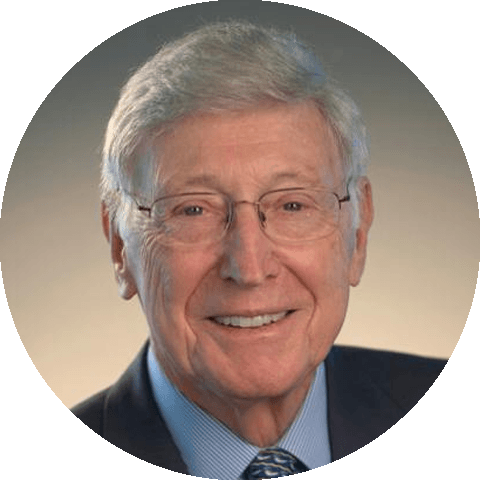
BERNARD MARCUS
$10,745,000 IN DONATIONS TO FDD (2008-2011)
(born May 12, 1929) Marcus is a Jewish billionaire and Home Depot founder.
Marcus was born to Russian Jewish immigrant parents in Newark, New Jersey.
According to tax filings, Marcus’ eponymous foundation has supported hawkish and neoconservative-linked groups like the American Enterprise Institute, Christians United for Israel, Friends of the IDF, the Hoover Institution, the Hudson Institute, the Israel Project, the Jewish Institute for National Security Affairs, the Manhattan Institute, the Henry Jackson founded America-Israel Friendship League and the Middle East Media Research Institute, as well as other conservative groups like Judicial Watch and the Philanthropy Roundtable. He also sits on the board of directors for the Republican Jewish Coalition and on the boards of the American-Israel Chamber of Commerce and Israeli Democracy Institute.
Marcus is a co-founder of the Israel Democracy Institute in 1991 and is located in Jerusalem, Israel. IDI is funded by charitable donations, which totaled $8,989,254 in 2017. The Institute's main funder is Marcus.
Trump's second biggest donor
In 2015, Marcus donated $1.5 million to Super PACs supporting Jeb Bush and Scott Walker. On June 1, 2016, when it became clear Donald Trump had won the Republican nomination, Marcus said, "I now stand in support of Donald Trump because the fate of this nation depends upon sending him, and not Hillary Clinton, to the White House."
Marcus was the second biggest donor to Donald Trump’s 2016 presidential campaign. Marcus was one of the quickest and largest responders to Trump’s call for donations for the mid-term elections of 2018. According to one report, Marcus “contributed $7 million to pro-Trump Super PACs, $500,000 to the Congressional Leadership Fund (CLF), and $2 million the Senate Leadership Fund (SLF).” The CLF and SLF are fundraising arms for the Republican Party.
When Bernie Marcus announced in 2019 that he would financially support the Donald Trump 2020 presidential campaign, it triggered calls for a boycott of Home Depot, even though Marcus was no longer with the company. In a June 2019 interview, Marcus said most of his wealth is in Home Depot stock.
Defender of Bannon
Following cries from the "Hate" group industry that Steve "Judeo-Christian" Bannon was "anti-Semitic". Marcus offered steadfast support for Bannon, the then Trump adviser. He said that “what is being done to Steve Bannon is a Shonda(the Yiddish word for ‘disgrace’ or ‘scandal’).”
The Anti-Defamation League’s CEO Jonathan Greenblatt, charged that Bannon harbored anti-Semitic and white nationalist views that are “hostile to core American values.” But Marcus responded, saying Bannon was a “passionate Zionist and supporter of Israel” and that “he opened a Breitbart office in Israel to ensure that the true pro-Israel story would get out. " Breitbart was actually conceived in Israel and has masqueraded as a pro-America populist media outlet. In reality it is a pro-Israel and GOP oligarchy fake news propaganda outlet and an enemy of the American general public and their interests.
Paying for Trump's Trump-Russia legal costs
He’s one of a handful of wealthy donors paying for legal costs incurred by Trump and Donald Trump Jr.’s attorneys as part of the probe into Russian election interference, via a Republican Party account. Marcus contributed $101,700, an amount matched by five other big donors.
Iran is the "Devil"
Marcus is also an outspoken critic of the Iran deal. In a 2015 Fox Business interview, he said, “when you do business with the devil you’re in deep trouble and I think that Iran is the devil.”. Marcus went on to insist that the JCPOA “is a treaty as far as I’m concerned,” which it is not, describing it as a “deadly, deadly treaty” that should have gotten a “full vote by the full Congress” and an “abrogation of the congress’s control.
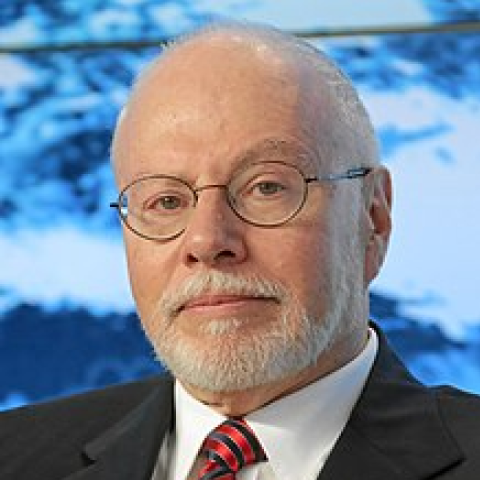
PAUL SINGER
DONATED $3,600,000 TO FDD (2008-2011)
Paul Elliott Singer (born August 22, 1944) is an American billionaire hedge fund manager, activist, investor, vulture capitalist, and philanthropist. His hedge fund, Elliott Management Corporation (EMC)—specializes in distressed debt acquisitions.Singer is also the founder and CEO of NML Capital Limited, a Cayman Islands-based offshore unit of Elliott Management Corporation. In 2017 Forbes rated Singer's net worth as $2.9 billion.
Singer's philanthropic activities include financial support for LGBTQ rights. He has provided funding to the Manhattan Institute for Policy Research, is a strong opponent of raising taxes for the wealthiest 1% of taxpayers and opposes aspects of the Dodd-Frank Act. Singer is active in Republican Party politics and Singer and others affiliated with Elliott Management are collectively "the top source of contributions" to the National Republican Senatorial Committee.
Fortune magazine described Singer as one of the "smartest and toughest money managers" in the hedge fund industry. A number of sources have branded him a "vulture capitalist", largely on account of his role at EMC, which has been called a vulture fund. The Independent has described him as "a pioneer in the business of buying up sovereign bonds on the cheap, and then going after countries for unpaid debts." In 1996 Singer began using the strategy of purchasing sovereign debt from nations in or near default—such as Argentina, and Peru—through his NML Capital Limited and Congo-Brazzaville through Kensington International Inc. Singer's practice of purchasing distressed debt from companies and sovereign states and pursuing full payment through the courts has led to criticism Singer and EMC defend their business model as "a fight against charlatans who refuse to play by the market's rules" and supporters of the practice have said it "help[s] keep kleptocratic governments in check.
Paul Singer funds the American Enterprise Institute (AEI), Foundation for Defense of Democracies (FDD), the Republican Jewish Coalition (RJC), and Foreign Policy Initiative (FPI).
In 2015, Singer invested $20 million in Start-Up Nation Central in which aims to lure international investments into Israel tech companies.
Elliott Management Corporation
"The Vulture" Singer strategically uses investments to weasel his operatives onto company boards with the goal of eventually taking over the company.
Twitter is one example of this strategy. Singer has employees on the Twitter board after Jack Dorsey accepted an investment deal from EMC. Since then EMC have been pressuring Twitter CEO Jack Dorsey to resign in order to increase their power grab within the company.
They are utilizing the same strategy at Softbank.
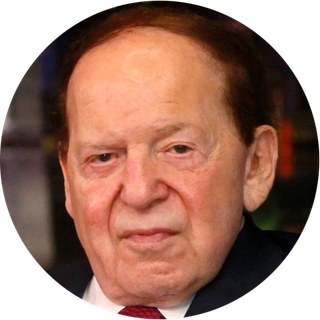
SHELDON ADELSON
DONATED $1,510,059 TO FDD (2008-2011)
(born August 4, 1933) is an American businessman, investor, philanthropist and political donor. He is the founder, chairman and chief executive officer of Las Vegas Sands Corporation, which owns the Marina Bay Sands in Singapore, and the parent company of Venetian Macao Limited, which operates The Venetian Resort Hotel Casino and the Sands Expo and Convention Center. He owns the Israeli daily newspaper Israel Hayom, Makor Rishon and the American daily newspaper Las Vegas Review-Journal.
As of July 2020, Adelson was listed by Forbes as having a fortune of US$29.7 billion, making him the 28th-richest person in the world and 17th in Forbes 400.
His father's family was of Ukrainian Jewish and Lithuanian Jewish ancestry. His mother immigrated from England
Top Trump Donor
Adelson, alongside his wife Miriam, was Trump’s biggest single campaign supporter, sending $35 million to pro-Trump Super PAC Future 45.
Earlier in the election cycle, Trump made clear that Adelson’s financial support came with strings attached. He mocked Sen. Marco Rubio (R-FL), who was courting the Adelsons. In October 2015, Trump tweeted “Sheldon Adelson is looking to give big dollars to [Marco] Rubio because he feels he can mold him into the perfect little puppet. I agree!”
Trump didn’t say why Adelson wanted to use Rubio, but in 2012 Newt Gingrich said that Adelson’s “central value” is unconditional support for Israel, specifically its right-wing Likud party and Prime Minister Benjamin Netanyahu (the two have reportedly experienced a falling out over the past three months).
Adelson was treated as a guest of honor when the Israeli prime minister delivered a March 2015 speech before Congress to blast the Iran deal, a rare moment in which Netanyahu appeared to be dabbling in partisan politics and throwing into question the bipartisan support usually enjoyed by Israeli leaders on Capitol Hill.
Iran Deal
Adelson, like Marcus and Singer, has given generously to groups opposing the JCPOA, contributing generously to the FDD. In 2015, his foundation contributed $400,000 to Christians United for Israel (CUFI), $50,000 to the David Horowitz Freedom Center, $100,000 to the Endowment for Middle East Truth (EMET), $7.45 million to the Israeli American Council, $250,000 to JINSA, $1.47 million to Shmuley Boteach’s The World Jewish Values Network, and $1 million to the ZOA, all groups that have opposed the JCPOA.
And the Las Vegas-based billionaire makes no secret of what he considers a preferable approach toward the Islamic Republic, telling a Yeshiva University audience in 2013 that U.S. negotiators should launch a nuclear weapon at the Islamic Republic as a negotiating tactic.
IDC Herzliya
The Adelson School of Entrepreneurship named after him is based at IDC Herzliya.
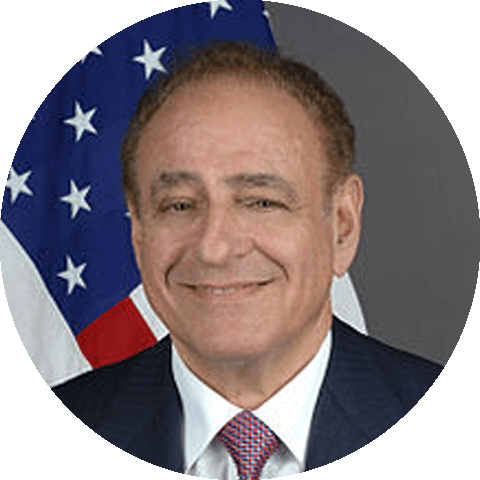
ROLAND ARNALL
DONATED $1,802,000 TO FDD (2001–2004)
March 29, 1939 – March 17, 2008) was an American businessman and diplomat. As the owner of ACC Capital Holdings, he became a billionaire with Ameriquest Mortgage. He was co-founder of the Simon Wiesenthal Center, and from 2006 until shortly before his death he was the United States Ambassador to the Netherlands.
Arnall parents were Eastern European Chabad Lubavitch Jews who had fled to Paris. During World War II,
n 1977 Arnall, a longtime supporter of Israel, helped found the Simon Wiesenthal Center and the Museum of Tolerance.
Ameriquest
Arnall was one of the key individuals responsible for the 2008 economic collapse. He was the billionaire owner of ACC Capital Holdings, the parent company of Ameriquest, which was once one of the United States's largest sub-prime mortgage lenders. By the end of 2005 two of Arnall's companies, Ameriquest and Argent, had funded almost $75 billion in subprime loans. A major factor of this development was Arnall's origination of the stated income loan, meaning loans were given without verification of income. In early 2006, the company announced a $325 million settlement with state attorneys general and law enforcement agencies and financial regulators in 49 states and the District of Columbia who had accused Ameriquest of misrepresenting and failing to disclose loan terms, charging excessive loan origination fees and inflating appraisals to qualify borrowers for loans.
In 2007 Arnall got out of the mortgage business having sold most of it to Citigroup for an undisclosed amount. Shortly after this transaction the subprime mortgage crisis began.
Political Activities
Since 2002, Arnall had given campaign contributions to California politicians including Arnold Schwarzenegger.
In the 2003–05 period, Arnall and his wife raised more than $12 million for George W. Bush's political efforts, including $5 million for the Progress for America Voter Fund, a self-proclaimed "conservative issue advocacy organization dedicated to keeping the issue record straight." Arnall was quoted as saying his support for Bush stemmed for his stance on Israel. In 2004 he was one of the top 10 donors to the Republican Party.
Mrs. Arnall also served as a co-chair for the 2004 Republican Convention and hosted a $1 million Bush-Cheney fundraiser at the couple's 10-acre (40,000 m2) home in Holmby Hills. In 2005, Ameriquest Capital and three of its subsidiaries comprised four of the 53 entities that each contributed the maximum of $250,000 to the second inauguration of President George W. Bush.[14][15] Writes USA Today, "Inaugural fundraisers Dawn and Roland Arnall found a creative way to pump more than the $250,000 limit into the event. Their mortgage firm, Ameriquest Capital, contributed the maximum, as did three subsidiaries, for a total of $1 million. The company declined to comment on its political giving."
In order to circumvent campaign finance laws, Arnall mandated that Ameriquest staffers, on company time, solicit campaign contributions from vendors and directed to selected candidates, including Antonio Villaraigosa, Mayor of Los Angeles from 2005–13.
Arnall's contributions to Republican Bush were a change of heart, and the result of Arnall's support for Bush's middle east policies post 9/11. Previously, Arnall was a long-time Democratic Party supporter and fundraiser. His wedding to Dawn Arnall was officiated by Democratic California Governor Gray Davis. Arnall was also an ardent supporter and fundraiser for Los Angeles Mayor Democrat Antonio Villaraigosa.
Chabad Sues Arnall's Estate
Following the death of Arnall, Chabad Lubavitch Rabbi Boruch Shlomo Cunin like a vulture devouring a corpse pursued legal to squabble with Arnall's fellow Jewish benefactors over the Arnall Estate claiming he was verbally promised a donation of at least $18 million. This legal action was taken despite the fact that Arnall was known for giving money to Chabad, for over more than three decades he contributed more than $4.4 million to their organization.

NINA ROSENWALD
DONATED $50,000 TO FDD VIA ABSTRACTION FUND
Rosenwald is an heiress to the Sears Roebuck fortune, Rosenwald is vice president of the William Rosenwald Family Fund and co-chair of the board of American Securities Management. She is the founder and president of Gatestone Institute,[3] a New York-based right-wing think tank with a focus on Islam and the Middle East. The organization has attracted attention for publishing false articles and being a source of viral falsehoods.
Rosenwald has focused on donating to pro-Israel organizations. She has been described as "an ardent Zionist all her life". Some critics have categorized her and the Gatestone Institute as anti-Muslim.
You can view Rosenwald's financing via Abstraction Fund here
Rosenwald's wealth has fueled a rapidly emerging alliance between the pro-Israel mainstream and the Islamophobic fringe.This alliance serves to sanitize and legitimize anti-Muslim propaganda and incorporate it with the ideas of neoconservative foreign policy heavyweights intent on promoting the Zionist agenda by invoking the spectre of a common “Islamofascist” enemy.
Rosenwald's first political involvement was the backing the hawkish Democrat Henry "Scoop"Jackson. A political figure rarely mentioned these days. Jackson and his network of aides would go on to be a cornerstone of the neoconservative movement. This network is highlighted in detail here.
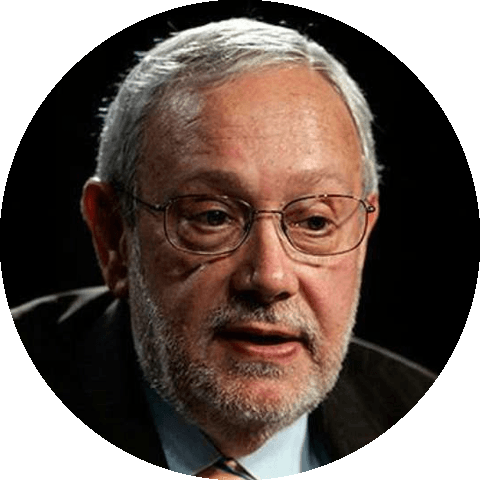
LEWIS RANIERI
DONATED $350,0000 TO FDD (2001-2004)
Lewis S. Ranieri (born 1947) is a former bond trader, founding partner and current chairman of Ranieri Partners, a real estate firm. He is considered the "father" of mortgage-backed securities, for his pioneering role in their emergence in the 1970s, during his tenure in Salomon Brothers, where he once was Vice Chairman.
Mortgage-backed Securities
Ranieri bought mortgages from one S&L and sold them to another, allowing Wall Street to become involved in the home mortgage market (and profit from the spread). He convinced Freddie Mac to assist with a deal which packaged older loans from Perpetual Savings, a troubled S&L in the Washington D.C. area. However, institutional investors only became attracted to the market when he and Larry Fink of First Boston created the CMO in 1983. In 1984, Congress passed the Secondary Mortgage Market Enhancement Act (SMMEA), overturning the previous prohibition against private banks selling mortgage-backed securities without a government guarantee. It also pre-empted state blue sky laws which had previously required investment banks to register with multiple states before selling them. Furthermore, institutional investors could purchase mortgage-backed securities, provided a nationally recognized statistical rating organization gave them a high rating; in effect allowing those investors to outsource their due diligence to such agencies. Ranieri attended the ceremony in which President Ronald Reagan signed SMMEA.
Ranieri also secured a tax exemption applicable to pools of mortgages held by a REMIC. Legalized by the Tax Reform Act of 1986, the mortgage-backed securities market reached $150 billion in 1986. However, Salomon Brothers fired Ranieri in 1987, which some characterized as him becoming a victim of his own "success", since his old traders staffed many Wall Street investment banks.
Ranieri formed Hyperion Partners, an investment firm, in 1988. In 2001, Ranieri and his partners at Hyperion sold Bank United of Texas, a firm they acquired in the late 1980s. Under Ranieri's leadership as chairman of the board, Bank United went from having been a failed savings and loan to being a successful $18 Billion asset regional bank at the time of sale.
As mortgage-backed securities came under scrutiny for their role in the subprime mortgage crisis, the United States housing bubble and the financial crisis of 2007–2010, critics took aim at Ranieri. In March 2007, Ranieri commented "I think [the risk] is containable. I don't think this is going to be a cataclysm."
Ranieri continued to defend his parasitic practice and refused to accept any responsibility for the financial crisis. In a 2009 interview he stated "It wasn't the concept of securitization that created the problem". Rather, he blamed nameless and faceless "Wall Street" for misusing securitization to create mortgage products that homeowners were unable to afford over the long term, such as those with low 'teaser' rates that became unaffordable when they reset. Ranieri refused to acknowledge the fact his mortgage-back securities enabled this behavior and would inevitably happen.
In the same interview, that occurred after the announcement of the 2008 bailout, worryingly Ranieri highlighted his firm's ongoing efforts to rehabilitate the US housing market by purchasing delinquent mortgages, working with the original homeowners to establish consistent payments, and then selling the newly stabilized loans.
Pro-Jewish and Israeli
Ranieri who is an Italian Catholic, has said many times that he has a special affection for Jews in general and for Israel in particular. he invested in many Israeli companies.

EDGAR BRONFMAN SR
DONATED $1,050,000 TO FDD WITH HIS BROTHER CHARLES (2001-2004)
Edgar Miles Bronfman (June 20, 1929 – December 21, 2013) was a Canadian-American businessman. He worked for his family distilled beverage firm, Seagram, eventually becoming president, treasurer and CEO. As President of the World Jewish Congress, Bronfman is especially remembered for initiating diplomacy with the Soviet Union, which resulted in legitimizing the Hebrew language in Russia, and contributed to Soviet Jews being legally able to practice their own religion, as well as emigrate to Israel.
Seagram
Following his father's death, in 1971, Bronfman took over as president, treasurer and director of Distillers Corporation-Seagram Ltd. His son, Edgar Jr., succeeded him as chief executive officer of the company in 1994.
The Bronfman family fortune was built by the father of Edgar and Charles, Sam Bronfman, who during Prohibition merged his Distillers Corp. in Montreal with Joseph E. Seagrams & Sons, Ltd. to supply "bootleggers" with top brand booze, becoming what Israel Shamir (writing on Mega) called a "Mafia boss." Under the successor co-chairmanship of Charles and Edgar Bronfman, Seagrams took a 24% controlling interest in DuPont. But soon after Edgar's son, Edgar Bronfman, Jr., became CEO of Seagrams, he sold off the holding, purchasing Universal Pictures and the world's largest record distributor, Polygram Records. On June 19, 2001, the Bronfmans sold Seagrams to former Lazard Frères partner Jean-Marie Messier, owner of media and communications conglomerate Vivendi, for $34 billion.
Through Seagrams and the WJC, Edgar Bronfman was a top business collaborator of some of the most prominent figures in the former Soviet Union and East Germany. Just months before the fall of the Berlin Wall and the collapse of East Germany, Bronfman was given the highest civilian award by the East German Communist Party, for his efforts to salvage the communist state.
World Jewish Congress
When former World Jewish Congress President Philip Klutznick stepped down in 1979, Bronfman was asked to take over as acting head of the organization, then was formally elected President by the Seventh Plenary Assembly, in January 1981. Together with his deputy, Israel Singer, Bronfman led the World Jewish Congress in becoming the preeminent international Jewish organization that it is today. Initiatives such as those seeking to help free Soviet Jewry; to expose Austrian President Kurt Waldheim's Nazi past; and to help victims of the Holocaust and their heirs to acquire compensation (including by Swiss banks); raised Bronfman's international profile during the 1980s and 1990s.
Bronfman wrote a letter to President Bush in mid-2003 urging Bush to pressure Israel to curb construction of its controversial West Bank separation barrier, co-signed by former Secretary of State Lawrence Eagleburger. Former Israeli prime minister Shimon Peres said in support of Bronfman, "Clearly, issues that are open for debate in Israel should be open for debate in the Jewish world."
Bronfman stepped down from his post as President on May 7, 2007, amid scandals and turmoil about Israel Singer. Bronfman and the WJC in the Supreme Court of New York County; Bronfman's suit claimed "that Singer did not pay back more than $500,000 in personal loans stemming from a 2004 investigation by the New York State Attorney General into the WJC's finances."
Bronfman's leadership is known for transforming the World Jewish Congress into the powerful organization it is today. As president, Bronfman is remembered most for his diplomacy with the Soviet Union in freeing Soviet Jews.
At his memorial held in January 2014, Former Secretary of State Hillary Clinton said of Bronfman, "Edgar was never shy of pressing an issue in the face of injustice," as she spoke about the many causes he championed in his lifetime.
Anti Defamation League (ADL)
Bronfman was the honorary vice chairman of the ADL as well as heading the Greater New York Appeal. According to Executive Intelligence Review, Bronfman was among an inner circle group called the National Committee that really ran the ADL.
Under Bronfman's watch ADL awarded criminal bigshot Morris Dalitz its Torch of Liberty award in deep appreciation for the gangster's financial assistance.
Soviet Jewry / Jackson-Vanik Amendment
In 1983, Bronfman suggested that "American Jews should abandon their strongest weapon, the Jackson–Vanik amendment, as a sign of goodwill that challenges the Soviets to respond in kind." The use of the word weapon" to describe the Jackson-Vanik amendment is an interesting interpretation. It is certainly worth speculating
what he means by this. It is also interesting to note that Russia President Vladimir Putin tried to use his relationships with Hank Greenberg, who was the chairman and CEO of the American International Group (AIG), to repeal the Jackson-Vanik provisions in the United States.
The initial goal of the Jackson-Vanik amendment was to apply economic pressure to the Soviet Union in an effort to allow citizens within the Soviet Union to emigrate. The idea behind the amendment was that Soviet Jews should be able to move to Israel or the United States. That could well be why Bronfman described the amendment as a weapon. But that wasn't the full extent of Jackson-Vanik. As many of the emigrants tended to be young and well educated, that led to the brain drain, a financial drain and increased demographic strain. Another resulting consequence was the emergence of a international criminal organization known as the "Red Mafiya". Criminal enterprises via the Soviet black market networks developed internationally gaining a stronghold in New York and Israel. This also created an economic strain on the USSR as money was moved to the more lucrative West.
After Mikhail Gorbachev's ascension in 1985, Bronfman secured an invitation to the Kremlin and on September 8–11, visited Moscow, becoming the first World Jewish Congress President to be formally received in Moscow by Soviet Officials. Carrying a note from Shimon Peres, Bronfman met with Gorbachev, and initiated talks of a Soviet Jewish airlift. It is said that Peres' note called on the Soviet Union to resume diplomatic relations with Israel.
In a Washington Post profile a few months after the September trip, Bronfman laid out what he thought had been accomplished during his September meetings. He said, "There's going to be a buildup of pressure through the business community. The Russians know the Soviet Jewry issue is tied to trade ... My guess is that over a period of time, five to ten years, some of our goals will be achieved." Author Gal Beckerman says in his When They Come For Us We'll Be Gone, "Bronfman had a business man's understanding of the Soviet Jewish issue. It was all a matter of negotiation, of calculating what the Russians really wanted and leveraging that against emigration."
In March 1987, Bronfman along with fellow delegates of the World Jewish Congress, flew to Moscow once again. Bronfman held three days of discussions with senior Soviet officials. Together, Bronfman and the World Jewish Congress delegates advocated for the freeing of the Jews living under Soviet rule.
On June 25, 1982, Bronfman became the first representative of a Jewish organization to speak before the United Nations. Speaking before the Special Session on Disarmament, Bronfman said, "world peace cannot tolerate the denial of the legitimacy of Israel or any other nation-state ... [and the] charge that Zionism is racism is an abomination."
Bronfman's goals for the visit were threefold. In his book, The Making of a Jew, he explained: First, he called for the release of all so-called Prisoners of Zion, the Jews imprisoned for expressing a desire to emigrate to Israel. Bronfman also wanted freedom for Jews in the Soviet Union to practice their religion. Finally, he called for the freedom for Soviet Jews to learn Hebrew, which he claimed was forbidden at the time despite there being Zionist sponsored Hebrew schools in Moscow.
A year later, in 1988, Bronfman returned to Moscow to meet with Soviet Foreign Minister Eduard Shevardnadze. This trip resulted in the Soviets promising to legalize the teaching of Hebrew in the Soviet Union and to establish a Jewish cultural center in Moscow. Bronfman said of this visit, "By their actions, they are indicating that they are eager to get the question of Jewish rights and emigration off the bargaining table. And it is actions, rather than simply words, that count."
The ultimate goal of all of this was to collapse the USSR, loot it and open it up to multinational corporations and international banks.
NXIVM Cult
In 2003, a Forbes magazine article reported that Bronfman took a course from NXIVM, endorsing it, but had since "grown troubled" due to the "emotional and financial investment" daughters Clare and Sara were giving to Raniere's group, remarking that Clare had loaned NXIVM $2 million, though she denied this. Bronfman was quoted stating, "I think it's a cult." In 2018, Raniere, then daughter Clare and her long-time mentor NXIVM president Nancy Salzman, among others, were arrested on federal charges in connection with NXIVM. In September 2018, daughter Sara was named the defendant in a 2018 class-action suit regarding her NXIVM activities.
After Edgar distanced himself from the cult, Raniere used his influence over his daughters to convince them that their father was conspiring against NXIVM and alleged financial investments Raniere made. The Bronfman sisters lost huge amounts of money whether Raniere took the money or lost it on bad investments isn't clear.
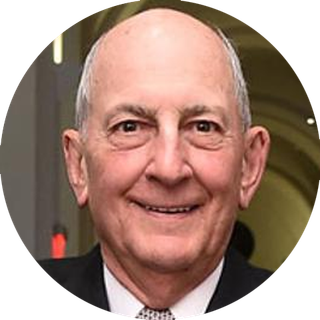
CHARLES BRONFMAN
DONATED $1,050,000 TO FDD WITH HIS BROTHER EDGAR (2001-2004)
Canadian-American businessman and philanthropist and is a member of the Canadian Jewish Bronfman family. With an estimated net worth of $2 billion (as of 2013), Bronfman was ranked by Forbes as the 14th wealthiest Canadian and 736th in the world.
Seagram
Bronfman held various positions in the family's liquor empire, Seagram, from 1951 to 2000. In 1951 Bronfman's father Samuel Bronfman gave Charles a 33% ownership stake in Cemp Investments, a holding company for him and his 3 siblings which controlled the family's corporate empire. Under the leadership of Charles and brother Edgar, it controlled billions of dollars in liquor, real estate, oil and gas, and chemical companies.
United Jewish Communities
Koor Industries
Charles Bronfman had been co-chairman of Seagrams, until its merger with Vivendi. He went on to chair Koor Industries Ltd., which is a high-tech holding company at the heart of the Israeli military-industrial complex. He left the company in 2005. He was also chairman of Claridge-Israel, Inc., which took over Bank Hapolim, when the Israeli government privatized it. This deal was brokered by Ted Arison, an Israeli who, in the United States, built the Carnival Cruise Lines into a billion-dollar business. Arison got his financing to start Carnival from Meshulim Riklis, one of junk-bond manipulator Michael Milken's major clients, and a close ally of Israeli Prime Minister Ariel Sharon.
Taglit Birthright
Bronfman and Michael Steinhardt co-founded Taglit Birthright, a program which provides a free, educational travel experience to Israel for young Jewish adults. Bronfman is one of its principal donors. Since 1999, the program has sent more than 700,000 young Jews from around the world on a 10-day free trip to Israel.
Bronfman Philanthropies Inc
Bronfman is Chairman of the Andrea and Charles Bronfman Philanthropies Inc., a family of charitable foundations operating in Israel, the U.S., and Canada. Since its foundation in 1986, the charity spent more than $340 million to about 1,820 organizations. In 2016 Bronfman closed the charity.

MICHAEL STEINHARDT
DONATED $850,000 TO FDD (2001-2004)
Michael H. Steinhardt (born December 7, 1940) is an American investor, hedge fund manager, and "philanthropist".
Steinhardt is offspring of the Prohibition-era "Jewish Syndicate" of National Crime Boss Meyer Lansky. His father, Sol Frank "Red" Steinhardt, was a bigtime gambler and convicted jewel fence, who worked with Meyer Lansky. "Red" Steinhardt was sent to Sing Sing on a five- to ten-year sentence, a fact that Michael kept off of his resume, in order to get his start on Wall Street
In 1967, he founded a hedge fund, Steinhardt Partners, that boasted an averaged an annualized return for its clients of 24.5% from 1967 to 1978 His fund lost 1/3 of its value in the 1994 bond market crisis. After recouping in part with a 20% return in 1997, he closed the firm, took the money, and ran.
In 2004 he made his hedge fund comeback with WisdomTree Investments, a fund with nearly US$43 billion in assets under management in 2020.
In a January 2014 article by Bloomberg, he was referred to as "Wall Street's greatest trader." Forbes Magazine reported his net worth at $1.1 billion as of October 2018.
Steinhardt Partners
In 1967, using earnings from his investments, Steinhardt founded the hedge fund Steinhardt, Fine, and Berkowitz (later Steinhardt Partners) with co-investors William Salomon, former managing partner of Salomon Brothers and Jack Nash, founder of Odyssey Partners. Steinhardt Partners averaged an annualized return for its clients of 24.5%, after a 1% management fee and a "performance fee" of 15% (early in his career, later 20%) of all annual gains, realized and unrealized, nearly triple the annualized performance of the S&P 500 Index over the same timeframe. After decades of successfully managing the fund, Steinhardt and his firm were investigated for allegedly trying to manipulate the short-term Treasury Note market in the early 1990s. He personally paid 75% of a total fine of $70 million as part of settlement with the U.S. Securities and Exchange Commission and Department of Justice. His firm made $600 million on the Treasury positions. In his book, "No Bull," Steinhardt said he did nothing wrong, but merely settled the case in order to "move on." Following a negative performance in his hedge fund in 1994, Steinhardt Partners enjoyed an excellent 1995, with performance in line with its historical record. The hedge fund closed and distributed all monies to its limited partners at the end of 1995.
Politics
Steinhardt is active in political circles ranging from centrist Democratic to neo-conservative, having been a past chairman of the Democratic Leadership Council and a board member of the Foundation for the Defense of Democracies (FDD), to which he has donated $850,000.
FDD was created by Mega Group members and their operatives to further their war on terror agenda and Middle-East foreign policy.
AP reported that FDD was paid $2,500,000 by United Arab Emirates to the FDD via disgraced Elliott Broidy and disgraced pedophile George Nader, to host a conference amidst Qatar diplomatic crisis about the country's role as a state-sponsor of terrorism. FDD's high-profile conference of 23 May 2017 was in line with UAE's policy at the time, which officially alleged that Qatar finances Islamist groups, adding that emails leaked shortly after show that UAE's Ambassador Yousef Al Otaiba had a "cosy relationship" with the FDD.
Steinhardt was chairman, for a decade, of the Democratic Leadership Council. He resigned from the organization in protest over President Bill Clinton's appointment of Lani Guinier (a Jamacan-Jewish civil rights activist) to a top Justice Department post, and refused to support Clinton's reelection in 1996, even though Clinton had succeeded him as DLC chairman.
Jewish Causes
Steinhardt is chairman of the board at The Steinhardt Foundation for Jewish Life and Taglit-Birthright Israel. He also makes public appearances, speaking with young Jewish kids through organizations such as Ezra USA and RAJE. He has been an active philanthropist, donating over $125 million to Jewish causes. He and Charles Bronfman co-founded Taglit-Birthright Israel, which has to date sent over 500,000 young Jews aged 18–26 on a 10-day trip to Israel without charge. In 2009 Steinhardt gave the American Hebrew Academy $5 million. In addition, to help with its fundraising, AHA (American Hebrew Academy) released an advertisement featuring his endorsement.
Steinhardt has founded a network of Hebrew-language charter schools, which are secular and open to both Jews and non-Jews. He has said "these schools teach Hebrew in a way that is demonstrably superior to Jewish day schools".
Sexual harassment and Hillel investigation.
On September 12, 2018 The Jewish Week reported that Hillel International was investigating Steinhardt for unwelcome “inappropriate sexual remarks” by two female employees of one of the many organizations he supports. The Jewish Week story quoted “sources close to the investigation” as saying that since, 2015, when the first complaint by a female employee occurred, it has been a “practice” within the organization for no female employee to have meetings with Steinhardt alone. The second woman making allegations received a written apology from Steinhardt, dated Aug. 23, 2011, acknowledging his inappropriate comments made toward her and two male colleagues at a meeting the year before. The report noted that Hillel had “quietly” removed his name from the board of governors listed on their website while the organization was investigating the claims. Hillel made an official statement that the complaints about sexual harassment by its donors were justified. Steinhardt stated in response to the findings “If I had been told immediately about concerns regarding anything I said at the time, I would have apologized immediately. I only recently learned about this investigation when Hillel called me about comments I made several years ago. I am sorry and deeply regret causing any embarrassment, discomfort or pain, which was never my intention.” As of March 2019, six women have claimed that Steinhardt had made sexual requests of them.
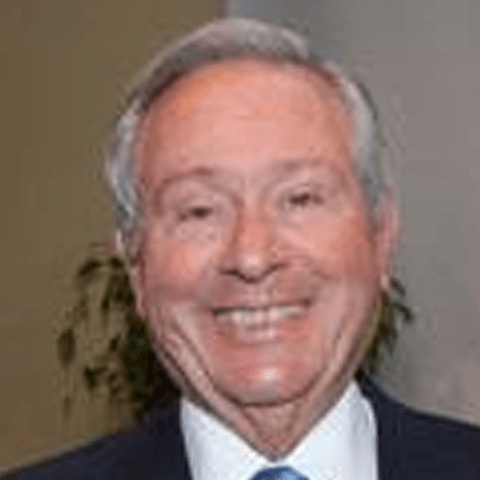
LEONARD ABRAMSON
DONATED $822,523 TO FDD (2001-2004)
Abramson is the founder and former CEO of U.S. Healthcare, a medical insurance company. He sold the company to Aetna Insurance for US$990 million.
He owned a stake in Israel's Bank Hapolim and owned the Maine Merchant Bank in Portland, which is a $20 million non-deposit institution, whose ostensible purpose is to make high-risk, venture-capital investments
Abramson likes to portray himself as a "philanthropist". Between 2001-2004 the Abramson Family Foundation (of Leonard Abramson) donated $822,523 to the hawkish Israeli lobbying group Foundation for the Defense of Democracies.
The FDD's mission "was to provide education to enhance Israel's image in North America and the public's understanding of issues affecting Israeli-Arab relations".
FDD has been identified as part of the Israel lobby in the United States by several scholarly sources. Sima Vaknin-Gil, Director General of Israel's Ministry of Strategic Affairs, had stated that the FDD works in conjunction with Israeli government, in particular the ministry she works for.
On 15 November 2019, FDD was officially registered as a lobby under Lobbying Disclosure Act of 1995.
LACKEYS
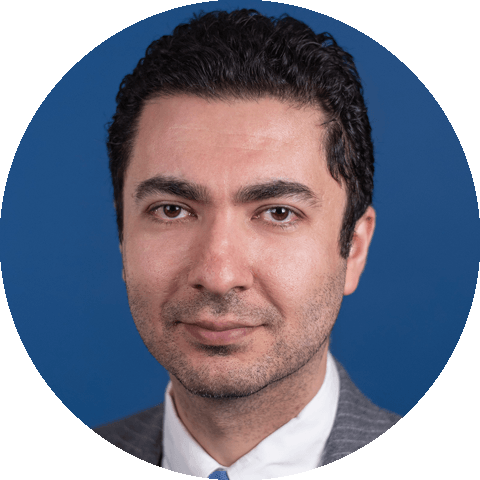
SAEED GHASSEMINEJA
MEMBER
Dr. Saeed Ghasseminejad is a senior Iran and financial economics advisor at FDD specializing in Iran’s economy and financial markets, sanctions and illicit finance.
Born and raised in Iran, Saeed earned his Ph.D. in finance from the City University of New York where he analyzed the effect of U.S. sanctions on Iran’s financial markets as part of his dissertation. He teaches finance at Baruch College of New York. Saeed has a BS in engineering from the University of Tehran and an MS in engineering from Ecole Speciale des Travaux Publics in Paris.
Saeed’s work has been published in The Wall Street Journal, CNBC, Fox News, Foreign Policy, Business Insider, The Weekly Standard, The National Interest, National Post (Canada), Hurriyet (Turkey), Arab News, and The Jerusalem Post. He has also been quoted and interviewed by The New York Times, The Washington Post, The Wall Street Journal, Fox News, Foreign Policy, Bild, and BBC Persian.
Saeed Ghasseminejad is Mark Dubowitz’s right-hand man whose work has gone largely unnoticed as better known FDD figures. Nevertheless, an examination of Ghasseminejad’s record can help provide an important corrective to any softening of the neocons’ image.
Ghasseminejad, who has championed “cleansing the streets of Islamist beasts” and frets about an impending Iran-fueled “Shiite apocalypse,” holds the title “Senior Iran and Financial Economics Advisor” at FDD. But more important than this title is Ghasseminejad work on behalf of Iran’s “fake opposition,” a loose assortment of reactionary activists who support economic sanctions and military pressure against Iran but whose politics stand in stark contrast to “true opposition” groups within Iran and their supporters in the diaspora, which is comprised of a broad coalition of labor and teachers’ unions, human rights groups, women’s rights and social activists, radical reformists, nationalists, secular leftists, and religious-nationalists.
Ghasseminejad was a civil engineering student at the University of Tehran, which—with the exception of the short-lived government of Prime Minister Mohammad Mosaddegh in 1951-1953—has always been a hotbed of anti-government activities. In 2002 Ghasseminejad and another student, Amir-Hossein Etemadi, a U.S.-based supporter of Reza Pahlavi, the son of Shah Mohammad Reza Pahlavi, published a student newsletter called Farda [“tomorrow”] in which they espoused “liberalism,” by which they meantilitary adventures of the kind envisioned by neoconservative supporters of “liberal intervention” in order to spread democracy by force. Ghasseminejad supported the U.S. invasion of Iraq in 2003 and in an article entitled “Why U.S. will attack Iran,” he implicitly advocated military attacks against his native country.
In June 2003, after sporadic demonstrations against the government in Tehran, Ghasseminejad was detained briefly. In a press conference after his release, he apologized to Iran’s Supreme leader Ayatollah Ali Khamenei, promised to be “a good citizen,” and stopped his political activities. Two years later, in the spring of 2005 Ghasseminejad and a small group of other students began publishing another newsletter called Talangar [roughly, “wake-up call”], which focused on criticizing leftist students and the newsletters that they were publishing.
Despite expressing his “love” for democracy and human rights and presenting himself as a “classic liberal,” Ghasseminejad has repeatedly embraced authoritarianism. In an article, entitled “What do we learn from Lenin,” published in Talangar, he expressed admiration for Vladimir Lenin and his concept of “democratic centralism.” He once referred to Augusto Pinochet, the Chilean dictator, as “the departed dear [leader] who saved Chile … and was much better than Salvador Allende,” the Chilean Socialist President who, similar to Mohammad Mosaddegh in 1953, was overthrown by a CIA-backed coup in 1973.
Ghasseminejad also spoke out in favor of the slaughter of Egyptians during protests after the coup by Egypt’s Abdel Fattah el-Sisi in 2013, writing in his Facebook page, “I just thought I should come to Facebook and express my appreciation for the Egyptian Army cleansing the streets of the criminal Islamic fundamentalists.” He added, “As a matter of fact, the right question is not why the Egyptian Army cleans Egypt of Islamist beasts, rather why the Iranian army allowed the Islamists to take control of our country” during the Iranian Revolution.
Hence, Ghasseminejad demonstrated that not only is he ignorant of Iran’s history, but also that he does not care about the slaughter of his own compatriots, since at least 3,000 people were killed during the Iranian revolution by the army. In addition, Ghasseminejad and his ilk have remained silent about the dictatorship of el-Sisi and the fact that Egypt has tens of thousands of political prisoners.
After the U.S. invasion of Iraq, Ghasseminejad began espousing the idea that “the engine for Iran’s political and social developments has been transferred to outside the country, and its democracy movement has been tied to the political developments in the Middle East and the U.S. interest and policy toward the region.” He left Iran in 2008, ostensibly for continuing his education, first moving to France and then to the United State. Since arriving in the U.S., he has relentlessly advocated economic sanctions and war against Iran.
In an open letter to President Obama in November of 2011, Ghasseminejad and like-minded “liberals” wrote, “We all know that the world’s inaction over the past decade led to the creation of a nuclear-armed North Korea. We believe that the Islamic Republic of Iran getting nuclear and other types of unconventional weapon would be repeating the same mistake, and must be prevented.” The letter warned that Iran’s response to Obama’s efforts at negotiation was “advancing its nuclear program toward weapon making.”
This was clearly false as four years earlier in November of 2007 the National Intelligence Estimate had declared that if Iran did have an active program of research for making nuclear weapons, it stopped it in 2003, an assertion that was reconfirmed in 2010 and 2012.
Ghasseminejad has clearly and repeatedly laid out his misleading, notoriously hawkish, and frequently patently false vision of Iranian politics in a series of articles he has written over the last decade.
In various articles published before JCPOA, for example, Ghasseminejad’s constant theme was that Iran has a military nuclear program, and that military confrontation with Iran will ultimately be unavoidable. In an article published by the now-defunct Persian website Rooz, he wrote, “Ultimately, sanctions will not force Iran to give up its program for nuclear weapons. … Making nuclear weapons is a goal that Iran will not stop pursuing. … The international community must choose between a nuclear Iran and confronting it militarily. I believe the world will not accept a nuclear Iran and, therefore, we will move toward military confrontation.”
After the IAEA issued a report in November 2011 about Iran’s nuclear program, Ghasseminejad and a group of like-minded Iranians issued an inaccurate statement declaring that “The new report of the International Atomic Energy Agency (IAEA) presents evidence that the [Iranian] government’s determined efforts for diverting its nuclear program to a military one have reached a decisive stage.” The statement also contained a brazen lie: “Through a hostile discourse and not cooperating with the Agency the current rulers increase day by day the possibility of military confrontation with Iran.” This was while Iran’s program had been under tight inspection by the IAEA since February 2003.
In an interview with the Clarion Project, an ultra-right website, Ghasseminejad and Sara Akrami, an Iranian who has occasionally written for the Front Page Magazine, the National Post, and the Jerusalem Post , stated: “Imagine the time when the Iranian government achieves its dream of completing its so-called “peaceful nuclear program” or, what we call it, a nuclear bomb. The entire region will definitely be set on fire.”
After President Obama nominated Chuck Hagel as his Defense Secretary in January 2013, writing in Times of Israel,Ghasseminejad declared, “The mere prospect that Hagel will fill the job is already harming efforts to convince Iran to stop its nuclear weapons program; it sends Iran a signal that President Obama is not serious about his stated opposition to the regime’s nuclear weapons program.” Note that this was over five years after the National Intelligence Estimate of November 2007, in which the U.S. intelligence organizations unanimously declared that if Iran had ac nuclear research program for producing nuclear weapons, it stopped it in 2003. Ghasseminejad apparently would like us to believe that he has privileged access to data that the U.S. agencies do not have.
Ghasseminejad presents himself as an expert on economic corruption in Iran. Khamenei is, of course, a dictator, and by helping Ahmadinejad come to power he was instrumental in abetting the systemic corruption that the Ahmadinejad administration left behind, which is why a very large majority of Iranian people despise both. Thus, given what the public already knows, there is no need to exaggerate anything or lie about the corruption. But, even here, Ghasseminejad lies. For example, he has propagated the notion that Khamenei’s wealth is close to $100 billion, which is supposedly stolen from the Iranian people. The reality, however, is quite different. The Islamic Republic’s Constitution has bestowed upon Khamenei the control on several large foundations whose assets are worth about $100 billion. But, the assets are not Khamenei’s and belong to the state. He appoints their directors and other key figures. While the Rouhani administration has still no control over these foundations, ever since he was elected in 2013, Rouhani has been pressing them to pay taxes on their net income, with some recent success as the idea of paying taxes has been accepted, although the amount of tax has not been decided yet.
Ghasseminejad’s campaign of falsehoods continued up until the JCPOA was signed in July 2015, which temporarily silenced Iran’s “fake opposition.” But, after President Trump was elected in 2016 and made it clear that he would take the U.S. out of the JCPOA, Ghasseminejad and his ilk suddenly intensified their campaign again.
Citing a Congressional source who had received a closed-door briefing by State officials, The Independent reportedthat “one individual” from FDD and another element of Iran’s “fake opposition,” the E-Collaborative for Civic Education, were being funded by the State Department to undertake an “Iran Disinformation Project.” This “E-Collaborative,” co-founded by Iranian-American activist Mariam Memarsadeghi and her husband Akbar Atri, is known in Farsi as Tavaana. It was supposedly founded to counter rhetoric emanating from Iran’s government. However, it eventually became warped into a vehicle for attacking all Iranians, Iranian-Americans, and Americans who oppose Trump’s “maximum pressure policy” toward Iran, or who are not “sufficiently supportive” of it. The project became so embarrassing that the State Department had to suspend its funding, said to be $1.5 million. Negar Mortazavi, the lead author of The Independent article, told LobeLog that she was told by one of the Congressional staff who attended the briefing that the individual was indeed Ghasseminejad and that he “worked for” one of the project directors, Iranian-American activist Mariam Memarsadeghi. Several of his pieces have, at least, been cross-posted at both the Iran Disinformation Project and FDD’s website.
Memarsadeghi—who once claimed that the “Iranian people love it when they hear what John Bolton and Trump say about Iran”—has said that “war is a prelude to peace” and that “peace for the sake of peace is boring.” Seemingly trying to justify military attacks on Iran, Memarsadeghi said in a speech, “If we take a look at history, [we see that] war has always been the beginning of improving lives and [the state] of countries and nations. … War is certainly terrible [and] we should try not to ever get there, but for many, for a variety of conditions, regaining their human dignity is not possible without war. I would also like to add that peace by itself, peace for the sake of peace, is very boring. As Mark Twain said, why would I go to heaven; I’ll be bored there” [Twain did not actually say that].
That Ghasseminejad would choose to work on a project with her would suggest that FDD’s “top” Iran expert holds similar extremist views. FDD, it should be noted, has denied any organizational connection with the Iran Disinformation Project.
More recently, as Trump has shifted to declaring that he does not want war with Iran, the “fake opposition” has begun changing its tune … again. The tactic that the “fake opposition” uses is a dual approach of writing one thing in Farsi about an issue that sounds very “moderate,” but completely the opposite of it when writing in English. For example, when Ghasseminejad writes in Farsi, he sounds like a moderate, writing on twitter, “The sanctions will weaken the Islamic Republic. Increasing diplomatic pressure will weaken it. Military pressure against it in the region will weaken it. [But] none of them will topple the Islamic Republic. Ultimately, it is up to the Iranian nation to either topple it or live with it.” However, what he writes in English is quite different. Immediately after this tweet, writing in English, Ghasseminejad claimed that “Tehran sees its attacks in the Persian Gulf have made Washington more eager to negotiate & its tone softer; it also notices an army of commentators try hard to argue that Tehran could not be behind the attacks. The only conclusion Tehran can make is that attacks are working.” In other words, Washington should get even tougher with Iran.
After it was reported that the UAE has released $700 million of Iran’s funds that had been frozen there, Ghasseminejad, writing on twitter on 21 October, stated that, “UAE has been a transshipment center for Iranian export/import. UAE to Iran is going to be what Switzerland was to Nazi Germany?” He was using the same rhetoric that Netanyahu has used against Iran, namely, that “it is 1938 [again] and Iran is Germany.”
After the trump administration began targeting Iran’s construction industry that creates millions of jobs in Iran, and imposed sanctions on part of the industry, Ghasseminejad wrote in a tweet, “I think sanctioning the whole industry would have been more effective. Foreign companies are active in the construction sector of Iran; the current sanction creates obstacles but does not ban their presence in Iran.”
While Ghasseminejad relentlessly advocates the harshest sanctions on the Iranian people, in a tweet he expresses his fake sympathies for children and their parents. Writing on October 3 [in Farsai, of course] Ghasseminejad stated, “Since becoming a father, whenever I hear the cries of a baby, I have sympathy for the baby’s parents and would like to help them, if I can.” The fake sympathy and “moderation” are the hallmark of the dual approach of Iran’s “fake opposition:” a “moderate” with sympathetic ears when writing in Farsi, but an ultra-hawk when advocating confrontation with Iran in English. Ghasseminejad has no sympathies for millions of babies and young Iranians, as well as their parents, who are suffering from the effect of the illegal U.S. sanctions, yet expresses his fake sympathies in Farsi with straight face. I suppose Ghasseminejad and “would like to help them” by advocating even more sanctions.
The net result of efforts by Ghasseminejad and his ilk in Iran’s “fake opposition,” aside from getting them high-paying jobs with lavish budgets, is the creation of false narratives about Iran that serve their push for military confrontation. They pretend that there is no opposition within Iran to Khamenei and hardliners—hence, war and sanctions are viewed as the only way to topple the regime. They claim that moderates and reformists support Khamenei and present “an acceptable face” for him, a false claim espoused by Secretary of State Mike Pompeo.
However, there are in fact extensive discussions within Iran among reformists and other political groups about boycotting the parliamentary elections in early 2020, unless they are free. After scattered demonstrations in December of 2017 and January of 2018, the “fake opposition” made false claims about the extent of the support for the demonstration, whereas the middle class, the engine for the democratic Green Movement of 2009-2011, stayed homeand did not join the demonstrations, because it did not want Iran to become the next Syria.
Finally, the harsh illegal economic sanctions that Ghasseminejad and FDD have been supporting have forced the true opposition in Iran to constantly wage battle in two fronts: One against Iran’s hardliners and Khamenei, and a second one against the destructive effect of the sanctions and the threat of war on Iran’s economy and their daily lives.
Ultimately, efforts by the FDD and its Iranian “experts,” like Ghasseminejad, to advocate sanctions and war against a nation of 85 million people show the unlikeliness of the neocons and their allies successfully rehabilitating their warmongering image. One cannot be a “humanitarian” while pushing for economic sanctions and war against a nation that has not attacked and invaded another country.

